






Sir Peter Williams QC was made a Knight Companion of the New Zealand Order of Merit on Saturday 11 April.
Sir Peter was knighted at his home in Ponsonby by the Governor-General, Sir Jerry Mataparae.
One of New Zealand’s best known criminal lawyers, Sir Peter is also well known as a long-time campaigner for prison reform, working for some 30 years with the Howard League for Penal Reform, of which he was a President. He argued that less money should be spent on putting people in prison and more on rehabilitation and addressing the causes of crime. He also pointed out that prisons often make people more criminal.
Sir Peter has been involved in more than 100 murder trials. Defendants he has represented include Arthur Allan Thomas, Terry Clark, and Ronald Jorgensen. He is also an author, and among his best sellers is last year’s autobiography The Dwarf Who Moved Youth justice
Youth justice pioneer Judge Michael (Mick) Brown died in Auckland Hospital on 2 April.
New Zealand’s first Principal Youth Court Judge, Judge Brown is acknowledged as having been the perfect choice to nurture and grow the new Youth Court initiative.
In 1980, he was appointed a District Court Judge, sitting at the Henderson District Court (now Waitakere). While at Henderson Judge Brown was involved in trialling what was to become a ground-breaking new way of delivering youth justice. Judge Brown sent young offenders and their families to the Waititi Marae to use family group conferencing, and his court was one of the trial sites for the proposed new system.
In 1989, he was appointed the first Principal Youth Court Judge. This was in preparation for the Children, Young Persons, and Their Families Act 1989. The Act was the impetus for what is now seen as a legal revolution in the way the justice system manages young offenders.
Judge Brown was made a Companion of the New Zealand Order of Merit for services to the Youth Court, education and the community in the 1996 Queen’s Birthday Honours. An obituary for Judge Brown is on the my.lawsociety website, http://my.lawsociety.org.nz/in-practice/people/ obituaries/obituaries-list/judge-michael-johnalbert-mick-brown-cnzm,-1937-2015
LawTalk is published by the New Zealand Law Society for the New Zealand legal profession. It is published fortnightly and has been published since 1974. LawTalk is sent to every lawyer in New Zealand who holds a current practising certificate. Lawyer numbers change over the year, but range from 11,700 upwards. LawTalk is also sent to further recipients who include members of the judiciary, Law Society associate members,
legal executives, Members of Parliament, media, academics and others involved in the legal services industry. Total circulation ranges between 12,400 and 12,800 copies. An online version of LawTalk is available on the New Zealand Law Society’s website at www.lawsociety.org.nz. This contains most of the articles included in each issue and a full pdf file of each hardcopy issue may also be downloaded.
LawTalk is printed on Sumo Matte. This is an environmentally responsible paper, produced using Elemental Chlorine Free (ECF), FSC© certified, Mixed Source pulp from Responsible Sources, and manufactured under the strict ISO14001 Environmental Management System. The FSC certification means that the international Forest Stewardship Council
has certified that the paper used to produce LawTalk meets its requirements at all stages along the production chain. The shrink wrap used for delivery of LawTalk is 25 micron biodegradable film manufactured in New Zealand. This degrades naturally. If you wish to discard LawTalk please recycle it. The wrapping may be composted.
EDITOR
Frank Neill · 04 463 2982 editor@lawsociety.org.nz
WRITERS
Established in 1869, the New Zealand Law Society regulates the practice of law in New Zealand and represents the interests of lawyers who choose to be members. The powers and functions of the Law Society are set out in the Lawyers and Conveyancers Act 2006. As well as upholding the fundamental obligations imposed on lawyers who provide regulated services, the Law Society is required to assist and promote the reform of the law, for the purpose of upholding the rule of law and facilitating the administration of justice in New Zealand.
26 Waring Taylor St, Wellington 6011, New Zealand
04 472 7837
PO Box 5041, Wellington 6145, New Zealand, or DX SP20202
President – Chris Moore
Board – Allister Davis (South Island), John Unsworth (North Island), Kathryn Beck (Auckland), Mark Wilton (Wellington)
Executive Director – Christine Grice
Elliot Sim · 04 463 2902 elliot.sim@lawsociety.org.nz
Sasha Borissenko · 04 463 2910 sasha.borissenko@lawsociety.org.nz
SENIOR DESIGNER
Andrew Jacombs · 04 463 2981 andrew.jacombs@lawsociety.org.nz
DESIGNER
Daz Yang · 04 463 7837 daz.yang@lawsociety.org.nz
ADVERTISING
Christine Wilson · 04 463 2905 advertising@lawsociety.org.nz
COMMUNICATIONS MANAGER
Geoff Adlam · 04 463 2980 geoff.adlam@lawsociety.org.nz
PRINTING
Lithoprint, Wellington
DISTRIBUTION
Western Mailing, Lower Hutt
ISSN 0114-989X (Print)
ISSN 2382-0330 (Online)
Unless it is clearly indicated, the views expressed in LawTalk are not to be taken as those of, or endorsed by, the New Zealand Law Society. No responsibility whatsoever is accepted by the New Zealand Law Society for any opinion, information, or advertisement contained in LawTalk.
This issue of LawTalk has a feature on the legal profession in Dunedin. As you will read, the profession here is in good heart.
Over the years Dunedin has transformed from being a key commercial centre to being a “regional centre”. Gone are the days of the gold rush, and of Dunedin being an industrial and manufacturing town and a commercial hub.
Dunedin can boast the oldest university; the first female admitted to the bar, Ethel Benjamin; legal luminaries like Alf Hanlon KC; and at one time all but one member of the Court of Appeal had strong links to the town.
Like many other regional centres the legal community has had to change and evolve to continue to serve the population and to prosper. Dunedin has seen a real focus develop on areas such as agribusiness, resource management and niche technology businesses.
There is a resilience in the profession. It is strong. Dunedin boasts 276 lawyers. Of the 41 lawyers practising at the separate bar, five hold the rank of Queens Counsel – surely the highest proportion in the country!
The town gives the practitioners the ability to work across a variety of fields, or to specialise.
While multinational mergers and acquisitions are not the daily bread of the Dunedin practitioner, the work is challenging and practitioners enjoy the benefits of the work-life balance that the city offers: no traffic jams, the outstanding natural environment of the Otago Peninsula and limitless possibilities for outdoor recreation.
The collegiality of the bar and the town-gown relationship with the Otago University Law Faculty cannot be overstated.
The profession here punches above its weight. Consider the number of Dunedin practitioners that serve on New Zealand Law Society committees, or the number of Dunedin practitioners that contribute to legal writing.
As a Dunedin City Council campaign once claimed: “Dunedin, it’s all right here!”
David Robinson New Zealand Law Society Otago branch President

ARTICLE & PHOTOGRAPHY BY

Law Society
Otago branch President and Gallaway Cook Allan partner David Robinson describes the legal profession in Dunedin as “collegial” and “really active”.
Mr Robinson – who is an Otago University graduate – says there are well-supported employment, family and new practitioners committees as well as a close criminal bar.
He says there is also a “reasonable contingent” in the commercial sector that joins with property and business law committee activities.
After the Christchurch earthquakes four years ago, the majority of the lower Stuart Street courthouse was assessed and deemed to be unsafe and the profession was forced to work out of three different buildings.
The Ministry of Justice says it is continuing to develop a business case for the strengthening of the Stuart Street courthouse and that it will complete its move into the High Street Court facility in mid-May, centralising all hearings.
Mr Robinson notes that there have been instances where substantial criminal trials have been moved to Christchurch where there are more resources.
“As a profession we’re anxious to make sure that, whatever facilities we have, we do get to see local cases being
Gallaway Cook Allan, founded in 1859, is the eighth oldest firm in New Zealand and the oldest in Dunedin. From offices in Dunedin and Wanaka the firm is active throughout the South Island.
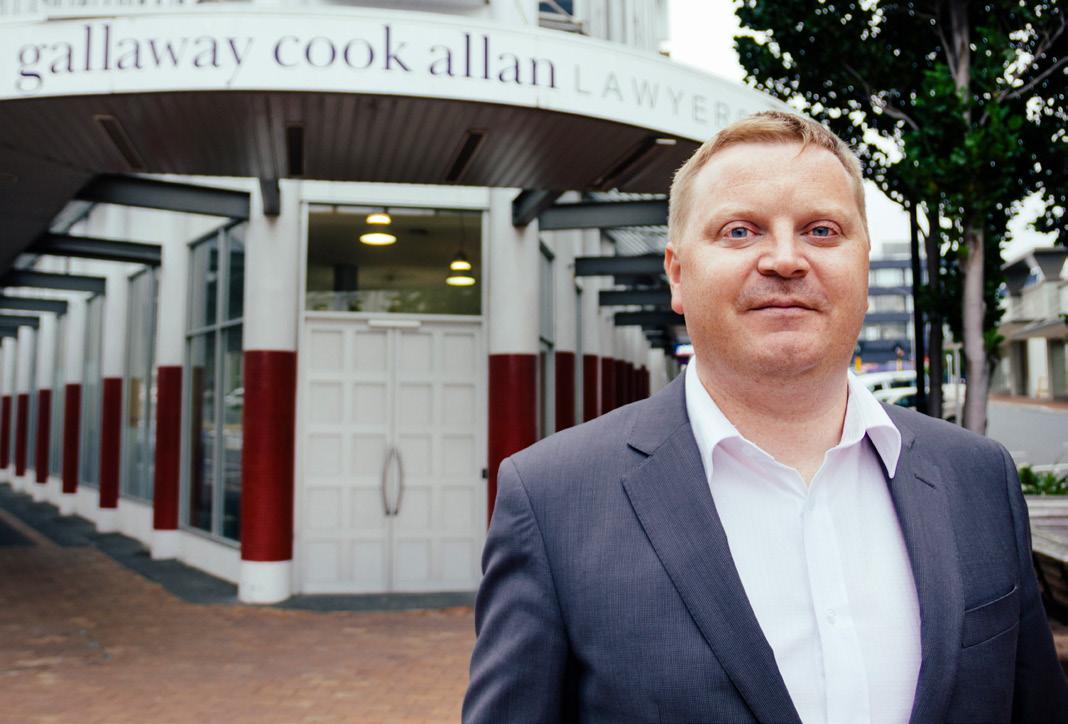
Mr Robinson says it has particular emphasis on agri-business and commercial matters, resource management and litigation, and private client work. The firm is also very active in the institutional sector, acting for Otago University and other educational establishments, as well as a number of local authorities.
dealt with here. A six-week multi-party jury trial was completed in the High Street facility in October last year. The court was not suitable for that trial,” he says.
Mr Robinson says that Gallaway Cook Allan maintains very close links with the university. A number of the firm’s solicitors help out with law faculty activities such as mooting and act as judges for witness examination contests. Gallaway Cook Allan also sponsors the Otago University Debating Society, helping the debating teams to travel to international competitions. It’s also common for local
LAW SOCIETY OTAGO BRANCH PRESIDENTlawyers – many of whom attended Otago University – to lecture at the university, according to Mr Robinson, who tutors in the criminal procedure programme.
“There are an awful lot of people that have been to the university and suddenly realise what a fantastic place Dunedin is and they just stay.
“I think the Law Faculty quite likes to be involved in the things that we’re doing [as a profession]. We have a faculty representative on the branch Council. There’s also an open invitation for us to attend faculty staff seminars. It is great for the profession to be able to attend and hear high calibre speakers on a regular basis.”
Despite living 16km out of town, Mr Robinson has an easy commute and is home in good time to make the most of the evening.
“I can’t be pointed to any other place in New Zealand where you can drive 10 minutes in any direction and be in a completely different environment.”
Community Law Otago has a roster of about 80 lawyers, 60 of whom are on an active rotation of five to six weeks. The centre also has about 90 law students on fortnightly rotation who work in groups of seven.
Community Law Otago managing solicitor Caryl O’Connor says lawyers from the city volunteer their time to help those students interview clients, conduct legal analysis and help steer them through the issues.
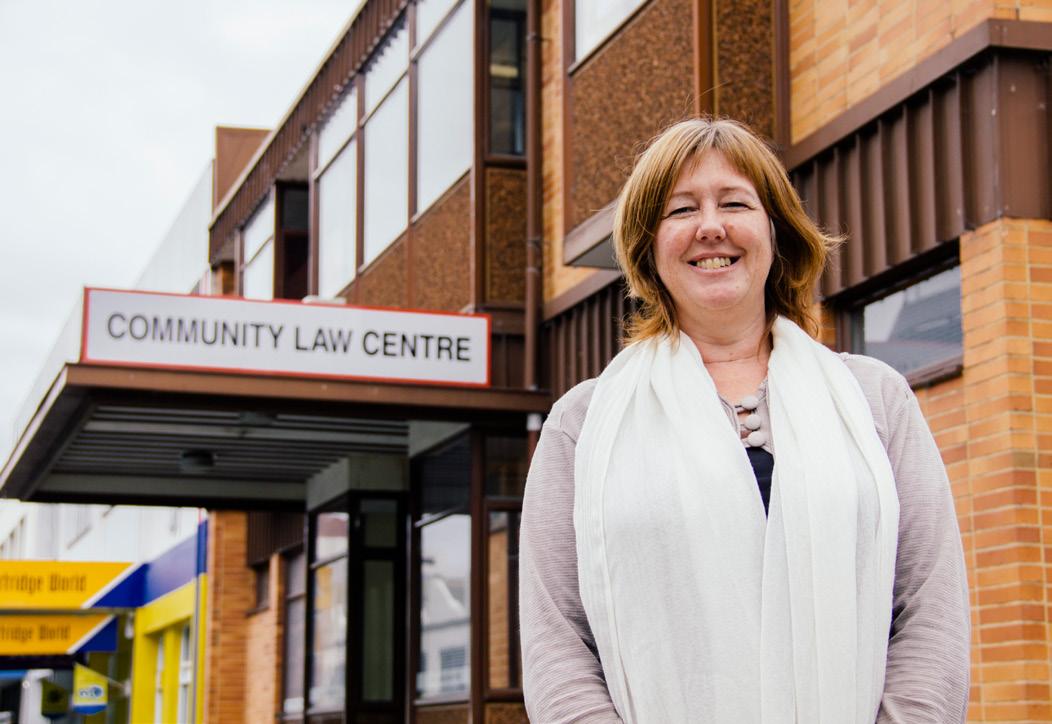
“The students are taken through the ideal interview process, determine the facts, the law, how the law is applied to the fact situation and what options are available to the client.
“We’ve the flexibility to allow for students and lawyers to participate as their availability varies … Most of those lawyers were law students at Otago and went through the law centre as students,” she says.
The centre has changed student training this year to make the experience gained “more of a bridge between law school and professional studies”, according to Ms O’Connor.
This initiative came from a review process last year, which aimed to devise ways to gather and measure quality
of service and to enhance the service to clients by honing the techniques of the students.
“So instead of training people madly at the beginning of the year and expecting them to remember it all, we’ve drawn the training out into an orientation session at the beginning, followed by some good written support work. Ongoing exercises and tutorials to practise interview skills and other more practical legal work with self-reflection techniques and case studies are undertaken throughout the year.
“That means when the students leave, we hope that their practical legal skills and case and client management skills have been identified and practically applied; the students can track their own progress over the course of the year,” she says.
Ms O’Connor says local lawyers on the roster are positive about the new programme.
“The lawyers are the facilitators of the conversations. The issues are workshopped, they guide the discussion and give the pointers as to where further questions need to asked, what further information needs to be gained and then canvas with the students the options the client may have available for resolution.
“They also really enjoy working with the law students, scouting out for new recruits and catching up on what the gossip is at law school. The students gain a lot, too, from having a rotation of lawyers. The approach employed to get to a resolution varies from lawyer to lawyer.”
Over the course of the year, the student advice clinic will help at least 2,500 people, Ms O’Connor says.
If you include information contacts or people dropping in for brochures etcetera, staff assistance, 0800 numbers and rural clinics, the centre will
see about 10,000 walk through its door every year.
According to Ms O’Connor fixed term tenancy issues, debt issues, family issues as well as hospitality, rural sector and retail employment matters are “huge” areas for the centre. Certain legal issues tend to crop up at specific times of the year.
She says November is “neighbours’ month”, when the weather picks up and everyone does some alterations and fences and chop trees, and mid-winter brings a spike in separations.
The centre is still working on how to distribute limited resources to best fit the needs of the Otago region, according to Ms O’Connor.
As part of this drive, the centre changed its operational name to Community Law Otago last month.
“We intend to stay afloat and reach as many people as we can. The purpose of the community law centre is to reduce barriers to the access of justice.
“The profession is very supportive of what we do … eyes are kept on what we’re doing, by the profession, to make sure that we’re not stepping outside the boundaries, but they’re more than happy to refer people here.”
Law Society Otago branch manager Debbie Ericsson graduated from Otago University with an LLB in 1998, having already completed a BSc in psychology, and also completed her Masters in Bioethics and Health law.
She worked four years at Aspinall Joel Barristers and Solicitors, then went out as a barrister sole at the end of 2002, working part-time. In 2008 Ms Ericsson became a barrister and solicitor trading as Ericsson Law.
“I’ve always worked part-time to work around children. I was predominantly a legal aid lawyer in family and criminal law. So doing this job allows me to have a bit of leeway to do the type of law that I want to do; rather than having to take everything and I’m focusing on criminal law.”
To fit parental duties in with that of the courts, Ms Ericsson says the key is to keep the rate of assignments to about 10 to 15 hours a week on top of what she does as manager at the Otago branch.
She admits there are “crazy court weeks”, but that they don’t happen all that often.
“I can shoot over to the court and do an appearance then shoot back. Occasionally I have a full defended hearing and will be away for half a day but people leave me messages and I get back to them as soon as I am back. I generally would come back from court even it is after 3pm and clear all of the messages and emails and make sure we’re up to date again and start the next day.”
“Really good. Very supportive and collegial. That’s one thing Otago’s really well-known for and if you’re ever stuck with something there’s always somebody to ask ‘what do you think of this?’, or ‘how do you think I should run that?’ ” Ms Ericsson says.
Catey Boyce, 25, has been a solicitor at Anderson Lloyd for a year.
Originally from Christchurch, the Cantabrian ventured south to do a Health Sciences degree, but later switched to a law degree after her first year.
In 2012 Ms Boyce graduated with an LLB and Biomedical Science degree majoring in genetics.
She then landed a job at Anderson Lloyd after summer clerking in its graduate recruitment programme at the end of 2013. It was a big jump going from being a student to being a fully-fledged lawyer, Ms Boyce says.
“It’s always hard because as a student your time and commitments are generally much more flexible. Obviously the responsibility of working as a lawyer is very different and it takes a lot of adjustment.”
Ms Boyce is predominantly working in commercial and corporate law, but she says the nature of the Dunedin legal environment means she has already had experience in trust, relationship property and conveyancing matters as well.
“It’s really good starting off so you get a taste of what areas interest you … I do really enjoy commercial work.

I think it’s very transferrable. You can practise in a lot of areas of the law from the skills you learn.”
Outside of the law, Ms Boyce is also completing her Masters in Health Law and Bioethics part-time.
“I’m trying to tie in my genetics training. It’s not a walk in the park, that’s for sure. But it keeps it interesting.”
She is also a member of the Otago Women Lawyers’ Society (OWLS) and the Dunedin Young Professionals (DYP) group.
“In the smaller regions it’s quite important to have those networks … OWLS runs many dinners and they get speakers coming in a lot which is good. Dunedin Young Professionals also run a lot of social and career-orientated events throughout the year.”
Ms Boyce says she will “hopefully start specialising in a particular area”, but that she will keep her options open.
“It’s very easy living in Dunedin, and I think the culture is quite supportive, which is nice to be in starting out. It’s the nature of having a small pool of lawyers, you’re always going to be dealing with someone you’ve probably worked with already, so that familiarity can be comforting.”
But does the intimacy of the profession mean that you’re somewhat under the microscope? There’s a bit of that, she admits. “But it’s not necessarily a bad thing being under a bit of scrutiny,” Ms Boyce says.
“Dunedin has a unique legal culture. I think it is the links to the university and collegiality that makes networks work,” Otago Women Lawyers’ Society (OWLS) Convenor Kate O’Boyle says.
Ms O’Boyle – who graduated in 2008 from Otago University and joined OWLS when she started practising – says the main focus of the society is the promotion of women in the law and to provide events for members, both social and career-orientated.
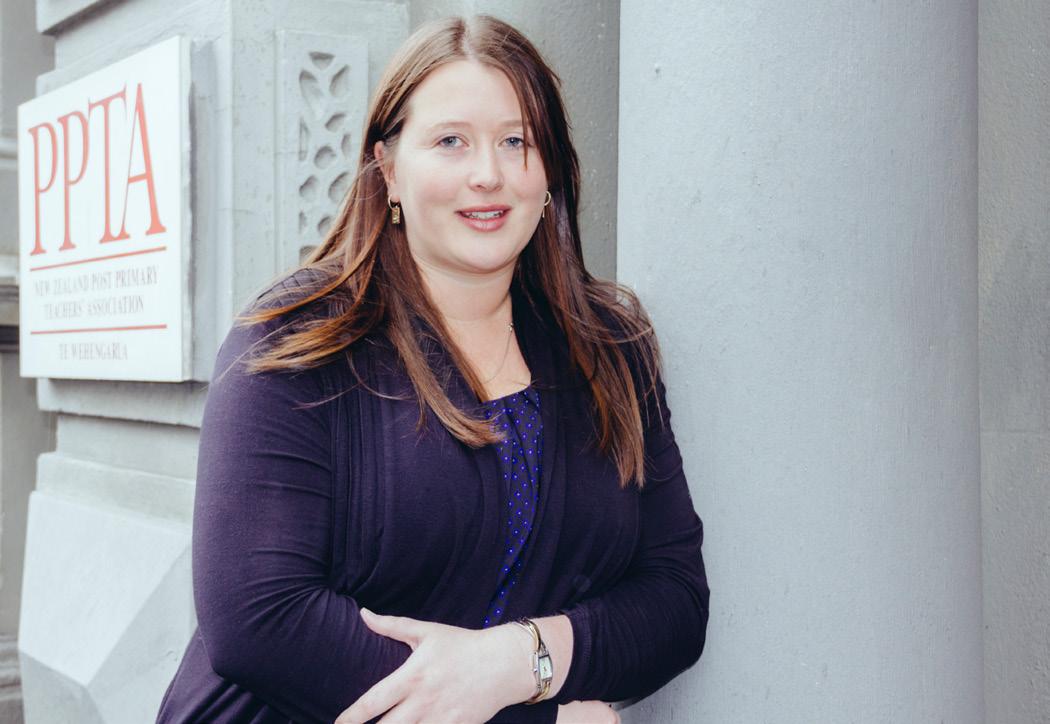
OWLS – which was founded in 1986 and has about 80 members – holds major events such as the New Zealand Law Foundation Ethel Benjamin address. Last year it had Justice Winkelmann speak to members on access to justice, which generated a lot of public interest. “It’s about getting a discussion happening and providing a supportive network for that.”
Ms O’Boyle says the society has started a new mentoring programme called Wise Owls, where experienced practitioners can
OTAGO WOMEN LAWYERS’ SOCIETY CONVENORpass on their experience and knowledge to others.
The initiative means practitioners can meet as a group to discuss a topic of interest ranging from legal practice issues to work-life balance, or seek out confidential mentoring.
“This has brought the more experienced members back to the society because they can give something back to the other members and that’s really strengthened the network.
“There has been a lot of discussion about women in the profession, particularly about the appointment of women as QCs and women on boards, along with trends coming through in research. For us it’s about opening up the discussion and creating a dialogue. Instead of focusing on the problem, it’s about looking to where we go to next. At a local level we want to keep that discussion going and provide a supportive network for our members,” Ms O’Boyle says.
One of this year’s efforts will involve strengthening links with the university and generating student membership.
“It gives them an opportunity to network with potential employers and to practise networking in a relatively supportive and safe environment.
“I must say from personal experience, the Dunedin profession and OWLS are very supportive of new practitioners and I think that comes back to the close link with the university.”
David Miller was a police officer for over 28 years before he became the Dunedin Court manager.
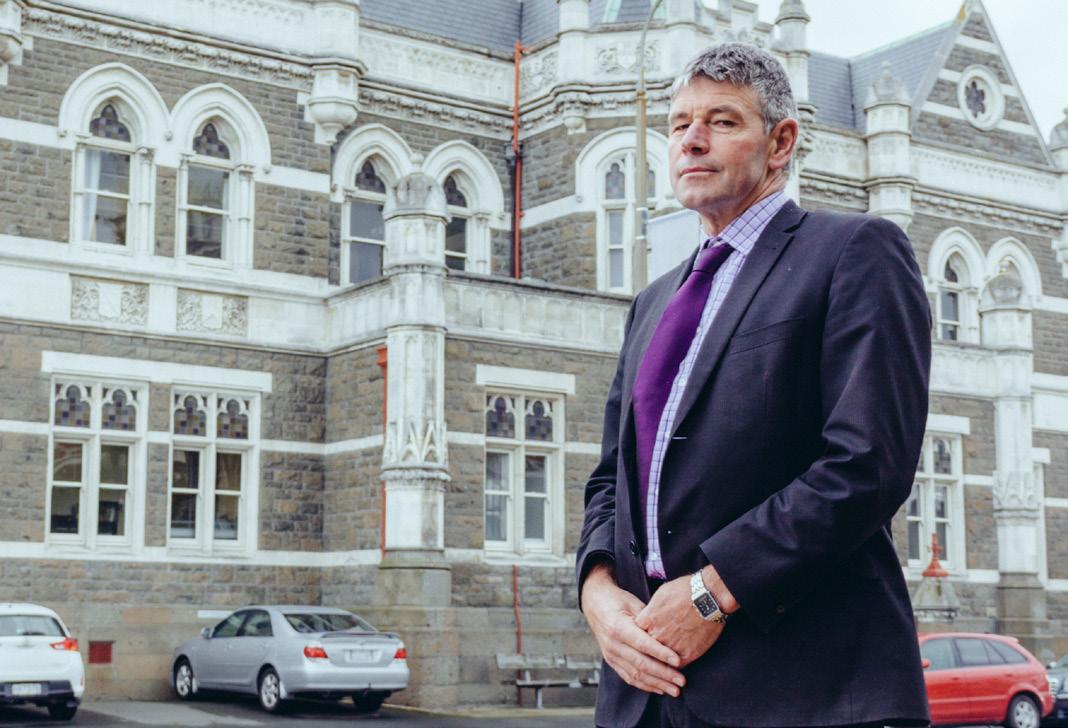
Mr Miller held such ranks as Constable, dog handler, Sergeant, Senior Sergeant in a variety of positions, including time as the officer in charge at Mosgiel.
He was also in charge of the Armed Offenders Squad and his final role was as Inspector Operations Manager Southern Police District.
Mr Miller says his extensive police work allowed him to develop a strong working relationship with court stakeholders.
“That’s had a lot of benefits for me. I know so many people at the police station, police prosecutors and I didn’t have to build trust in my stakeholders and confidence.”
Mr Miller says court disruptions and relocations after the Canterbury Quakes have been “a long slow process with frustrations along the way”, but that people have carried on regardless.
“People have just got on and done it, as it’s now being going on for over three years since the earthquake in Christchurch and this building [Lower Stuart Street] didn’t
DUNEDINmeet the new standards.
“Everyone wants to come back here and when the ministry said they were moving us up there [to High Street] they let the community know that they will come back here and that is the expectation.”
“I think we’ve taken around 40% of the average amount of days for each case in the last couple of years,” Mr Miller says.
He attributes the court’s success to good staff and a profession which displays “the whole package”.
Criminal Barrister, Anne Stevens, was admitted in 1988 and has been a barrister sole since 1998 in chambers in the Octagon, Dunedin.
Mrs Stevens says that she loves the lifestyle that Dunedin offers.

“It’s fun, full of student energy and coloured by local creativity. We live on Mount Cargill about 10 minutes north from town, looking down on the harbour, which is stunning. Having three acres of garden makes it a special place."
Mrs Stevens says because the profession is so small, everyone seems to know each other, and a lot of lawyers are linked to the university.
“I think that level of intimacy is very pleasant and helpful.
“There would be a good fifth of the legal
profession that do something at the university. I do criminal procedure, a four-week programme for second years … It’s great, meeting young people. It’s hard to get them to court though, they want to be spoonfed,” she laments.
Mrs Stevens says the introduction of the Public Defence Service (PDS) to a small centre like Dunedin has been the death knell for junior criminal practitioners because they cannot obtain enough assignments to make it economically viable.
“That makes it very difficult for the private bar to bring practitioners up through
the ranks. When the four or five senior practitioners who do the bulk of the jury trials in Dunedin stop work, perhaps in the next five years or so, then there just won’t be the practitioners available with jury level experience.
“The profession has no impact on government policy regarding the distribution of legal aid funds and the way they’re skewed now they go disproportionally to PDS. If you only get three assignments a month from the roster as a junior lawyer, you can’t make a living, and no firm wants you to be doing that work. For senior ones like me it’s fine because I’m doing the jury trials and a lot more private instruction. I am 61 and there is a lot of gardening to do,” she says.
CRIMINAL BARRISTER Anne Stevens“It all connects up pretty well really,” Otago University Dean of Law Professor Mark Henaghan says when he describes Dunedin’s legal community.
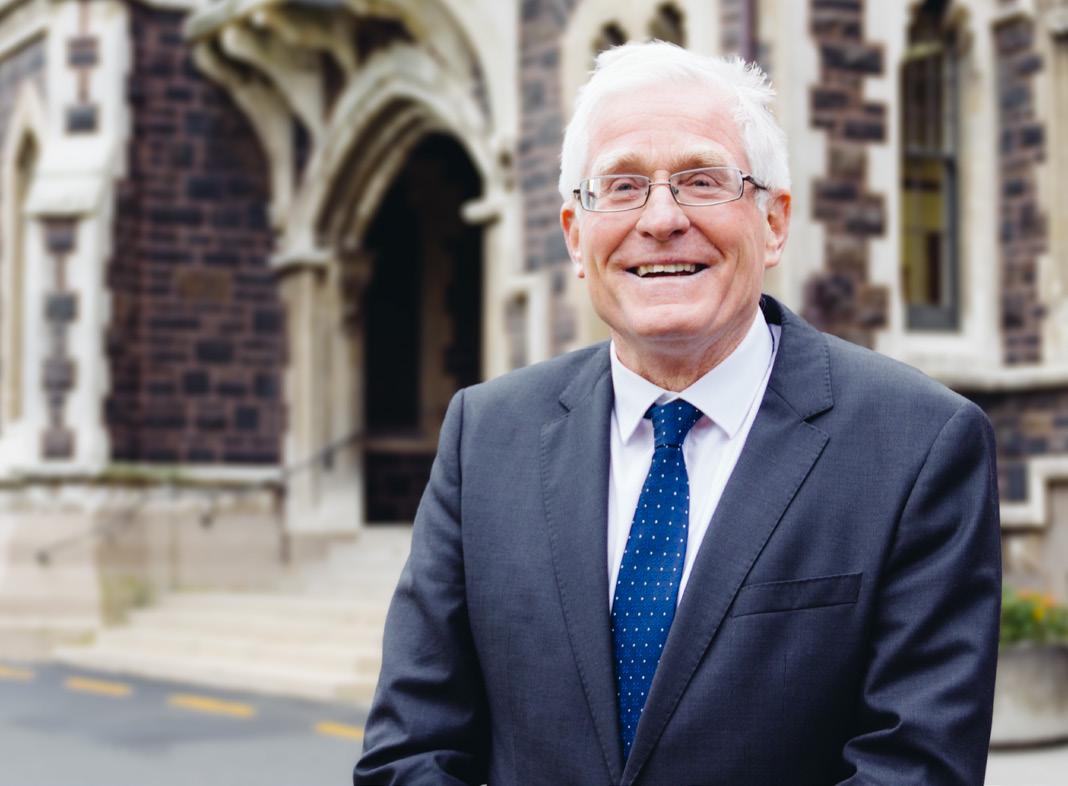
He says being a large university and having by comparison a smaller legal profession provides a “good mix”.
“We bring the profession in to do teaching when it’s necessary and add their practical expertise. I think pretty much all of the profession here are Otago graduates and come along to our public lectures. They judge almost all of our moots and other competitions.
“It’s the extra stuff that really makes a difference, where they [the profession] can add their practical expertise. Academics have their place in terms of teaching based on their research – we can do some really detailed work and I think we put a lot of effort into that as academics – but it is the practical skills where the profession can really add their expertise and insights. That
really adds that extra dimension.”
Even if a lawyer doesn’t have their firm sponsoring an event they will still go and do their bit, according to Professor Henaghan.
“They do it because of the university. It’s not a branding exercise for them. It’s an expense in coming down and supporting our students. We never take that for granted and it makes a big difference.”
With 85% of students not originally from Dunedin, almost all will head outside Dunedin to work, but they’re encouraged to stay in the city.
“The majority will largely go north and some will go to Invercargill, but they go all over the country really … We try to encourage them to stay here,” Professor Henaghan says.
He says some firms in Dunedin are creating summer clerkships and that the profession and the university are working on a new programme to ensure that every law student has some practical experience in a law firm.
He says this new programme will be operating “fairly soon”.
“This is so they can spend some hours getting a feel for what it’s like working in a place like Dunedin, where the majority of firms are smaller. That gives them a different
experience because many of them have summer clerkships in the big firms.
“I think for law students, sometimes the only perspective they get on life is in the large firms. Because the large firms have the ability to advertise widely, and they think this is life, but you do need students to work in all the provinces around the country and to look forward to that work. Once they’ve had that experience it gives them a comparison. I think that’s important.”
“Physically we're close. We’re five minutes from the courts, the lawyers are just around the corner. I think physical closeness makes a difference because you are bumping into each other and, of course, a lot of the profession are coming in here and doing stuff anyway,” Professor Henaghan says.
He says the Dunedin legal profession is “extremely collegial” but that it is also competitive.
“While they have a job to do and there is an element of competition, they treat each other well.
“I wouldn’t want to say we live in some sort of fantasy world, but it’s a good thing … People pass work to each other and support each other in different ways.”
Chris Moore has been re-elected President of the New Zealand Law Society. He was elected unopposed at the Law Society Council meeting on 10 April. Mr Moore became the Society’s 29th President in April 2013, when he succeeded Jonathan Temm. Mr Moore was chair of the Property Law Section from 2003 until 2013, President of the Law Society’s Auckland branch from 2009 until March 2013, and Vice-President (Auckland) from 2012 until he became the Society’s President. Mr Moore is a partner of specialist projects firm Greenwood Roche Chisnall. He graduated with an LLB from Otago University and practised for a short time in Auckland before moving to Whakatane, becoming a partner in the law firm now known as Hamertons Lawyers Ltd. He returned to Auckland to join Russell McVeagh, where he was a partner for 10 years. He then moved to Auckland law firm Meredith Connell, where he was a partner from 1999 to 2013.

Kathryn Beck was re-elected unopposed as the Auckland Vice-President of the New Zealand Law Society at the Law Society Council meeting on 10 April. She is now serving her second term in the office. An employment law specialist, Ms Beck is a partner of Swarbrick Beck Mackinnon in Auckland. Previously she was a partner of Haigh Lyon, where she led the employment team and was head of litigation. A former convenor of the Law Society’s Employment Law Committee, Ms Beck has acted for both major employers and leading unions. She is also experienced in alternative dispute resolution.

A team of Meredith Connell lawyers sped their way to victory in this year’s Cure Kids Adventure Race.
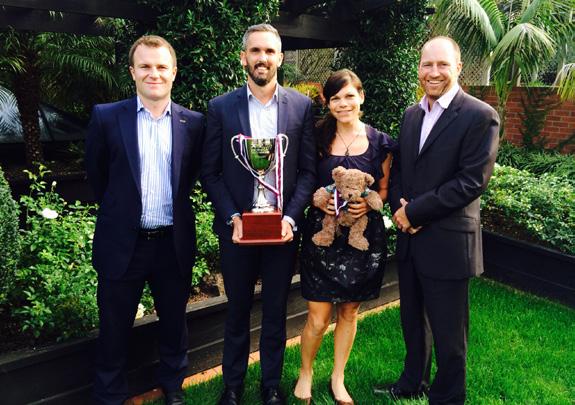
In marked contrast to last year, when they got woefully lost in the tough terrain the racers have to negotiate, this year the Meredith Connell team took just over seven hours to place first of the 35 teams entered.
In doing so, the team of Mark Davies, Alice McCubbin-Howell, Thomas Refoy-Butler and Mike Walker raised just on $10,000 for the Cure Kids Foundation. Collectively, the teams have raised more than $400,000.
“The event itself is pretty tough,” Mr Refoy-Butler says. “It’s competitive and quite a few teams take it seriously.”
The race took place in three stages. The first was a run/trek leg, the second a mountain bike leg, and the third another run/trek. While that sounds simple, the first “run” found the team holding onto punga ferns as it skirted round bluff faces, swimming through culverts of unascertainable depths and hopping over rocks on the coastline.
The “mountain bike” included a solid 400 metre ascent over two kilometres, which involved far more pushing and sweating than riding. By the time the team hit the final “run” there was definitely a fair bit of shuffling as they made their way down slippery river beds and waterfalls.
Although the team was in the competition to win, the main focus was on the children.
The Cure Kids Foundation is dealing with children who are in and out of hospital on a regular basis, Mr Refoy-Butler says.
At the prize-giving, one of the Cure Kids Ambassadors spoke. Georgina is 11 years old and a burns victim. She spoke with charisma and confidence about her injuries, her road to recovery and what Cure Kids has meant for her.
“It was quite humbling really to hear her speak,” Mr Refoy-Butler says, “and I think it puts it all into perspective.”
Any further donations, he says, would be appreciated, and can be made at https://secure.curekidsfundraising.org/registrant/TeamFundraisingPage. aspx?teamID=84694)
Well over 2,000 lawyers have greatly benefitted from NZLS CLE Ltd’s Litigation Skills Programme, which celebrates its 30th birthday this year.
The outstanding success of the programme “is proved by its longevity,” says this year’s programme director, Fiona Guy Kidd.
“No matter what your experience coming in – whether you’ve been in court a lot or not – you can still get a lot from the course.”
This is true not only for the participants, but for the faculty too, who find themselves learning from the programme.
“It works and it continues to work,” Ms Guy Kidd says, “because of the National Institute for Trial Advocacy (NITA) method of critiquing the participants.” (The first course, held in August 1986, was directed by NITA regional director Joe Jaudon of Denver.)
Course participants get “great benefit” from it.
Last year’s programme director, David Clark, describes the benefit in this way, comparing participants entering the course with those at the end of the course “the standard has been lifted massively”.
“The value to the individual, and therefore to the profession, is that these people have got a whole week to focus on themselves and their skills and learning from people who are very experienced litigators,” Ms Guy Kidd says.
“We have four team leaders and the participants are divided into four teams, each led by a judge. This year we have District Court Judges de Ridder, Morris, and Thompson and Justice Kós from the High Court.”
Participants learn by doing and being critiqued and they learn from watching themselves on a recording of their performances. “They also learn from watching demonstrations, such as of an opening address, leading a witness and cross-examination.
“Participants also learn through doing drills – having a go at doing a skill till it becomes second nature. It is very intensive.”
The all-important critiquing takes place throughout the week. Participants are essentially critiqued by two faculty members in front of their classmates, together with a one-on-one review of the recording of their performance with another faculty member.
Being on the faculty is something she has enjoyed, Ms Guy Kidd says.
“Often litigation can be a very lonely exercise, and you don’t get to interact with others, except seeing opposing counsel.
“But on the programme you get exposure to seeing a wide range of people performing litigation skills.
“A lot of the faculty members keep coming back. People
have been doing it since 1986. In fact, Nigel Hampton QC was on the faculty in 1988 and Robert Lithgow QC is often involved. He’s the senior statesman of litigation skills. Both were faculty members again last year
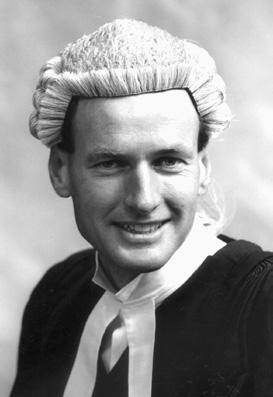
“The faculty keep on coming back because they get a lot of enjoyment out of seeing participants improving and developing. And it’s a great opportunity for them to catch up with colleagues. It’s a very collegial atmosphere.”
“It is great for faculty as well,” Mr Clark agrees.
“You get a lot of benefit just watching other faculty relate to younger members of the profession. You have got lawyer demonstrations and it’s just fantastic watching those, because everyone learns from that. It doesn’t matter whether you are junior or senior, we are all learning.
“It’s a great course and wonderfully run by NZLS CLE Ltd,” he says.
This outstandingly successful programme owes much to the late Wellington lawyer Douglas Wilson.
Mr Wilson attended a litigation skills course run by the NITA in Denver, Colorado, in 1984.
Following that, he and his wife visited Terence Arnold (now Judge Arnold) in Canada. “We got talking one evening … and got very enthusiastic about setting one of these up in New Zealand,” Judge Arnold later recalled.
Mr Wilson and his wife returned to New Zealand, with Mr Arnold following five months later to find that Mr Wilson already had the idea well under way. After that, they worked on the project together.
They talked to Annette Black (then Director of Education for the New Zealand Law Society) about the value of such courses, and they persuaded the NZLS Continuing Legal Education Committee.
They then succeeded in gaining the agreement of Justice Eichelbaum and Judge Satyanand to become team leaders – and so the course happened.
“It was a success and that success has been emulated every year ever since.”
Douglas Wilson’s “finest moment … must be the New Zealand Law Society’s residential Litigation Skills course which offers a splendid example of what can be done by a professional body in enhancing
John Marshall QC’s legacy as Chief Commissioner of the Transport Accident Investigation Commission (TAIC) was honoured at a function held for his retirement at Parliament’s Banquet Hall on 25 March.
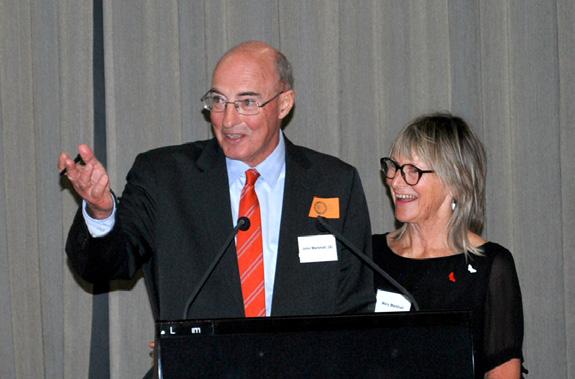
“Over the past five years, as Chief Commissioner of TAIC, John has made a considerable contribution,” Transport Minister Simon Bridges said.
“He has been responsible for the leadership of several complex, sensitive and high profile investigations, including the Rena grounding, Carterton balloon tragedy and the Fox Glacier skydiving tragedy.
“Under John’s leadership, the crucial importance of the commission’s work has become more visible and better understood. He has shown considerable dedication and commitment to the role,” the Minister said.
“The issue of drug and alcohol impairment in transport has always been particularly close to John’s heart.
“Back in 2012, 11 people lost their lives in the Carterton hot air balloon tragedy, which naturally became the focus of an intensive inquiry by the commission. Before delivering the commission’s findings, John met with the families of the victims to explain the conclusions and
The following day, he released these conclusions and recommendations to the public.
“The commission’s findings were clearly set out, without being alarmist, but with firm understatement. The findings made clear the serious issues the commission believe[s] need to be addressed regarding impairment in transport in general,” Mr Bridges said.
Mr Marshall’s leadership had borne “significant results for TAIC,” the commission’s new Chief Commissioner, Helen Cull QC, said.
“From your years of serving on the Law Society committees, the Board and, ultimately, as NZLS President, you brought to the commission your understanding of the difference between governance and management.
“You gave our CEO, Lois Hutchinson, the licence to advance effective strategic planning for the organisation and actively engaged the board with it.”
the skills and standards of its members to the public benefit,” Tim Blennerhasset, of Chapman Tripp Sheffield Young, wrote in an obituary about Mr Wilson, published in LawTalk on 10 October 1990.
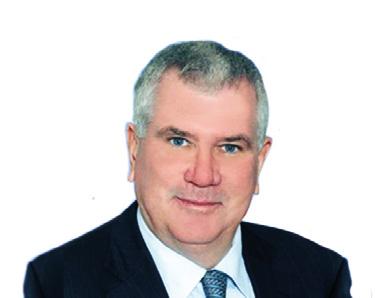
This year’s Litigation Skills Programme will run from 16 to 22 August at Lincoln University, Christchurch. Applications for the programme must be received by NZLS CLE Ltd by 5pm on Wednesday 3 June. Limited financial assistance may be available for applicants through the Douglas Wilson Advocacy Scholarship Trust.
More experienced practitioners with at least six years’ civil or criminal law experience will also benefit from the advanced course which is based on the same NITA teaching method. This five-day, non-residential course will take place from 14 to 18 June. Applications for the advanced course close at 5pm on Monday 4 May.
For more information, or to apply for the upcoming Litigation Skills Programme, visit www.lawyerseducation. co.nz
Ms Cull described Mr Marshall’s leadership style as “a straight-forward, respectful and quiet one, which gives everyone a chance to express their views and from that, a consensus approach to some of the difficult problems the commission has faced.
“It has provided a strong platform on which the commission has stood on issues of public safety and regulatory matters.”
Acting on the commission’s specific recommendations, the Ministry of Transport has undertaken “significant work in alcohol and drug consumption on transport safety, with a view to implementing the commission’s recommendations following further submissions.
“This was something that I know you were very passionate about and it is very heartening to see the way the work of the commission has been acted upon – a matter that you can take personal pride,” Ms Cull said.
Two long-standing Queenstown lawyers have joined forces to create a new boutique law firm in the resort. Husband-and-wife duo John Troon and Dale Lloyd opened their new practice, Lloyd Troon Law, on 1 April. Both have been practising in Queenstown for almost 30 years each. It’s not the first time the pair have worked together – both were partners at Mactodd before Ms Lloyd branched out on her own to set up Dale Lloyd Law in April 2013. Ms Lloyd has been practising for 25 years and is a civil and criminal litigator and family law specialist. Mr Troon, who has been practising for 41 years – 28 of which have been in Queenstown – is a commercial and property lawyer who also

specialises in trusts, estates and asset planning. Mr Lloyd and Ms Troon are joined by practice manager and legal executive Sarah Swale and personal assistant Keri Chisholm.
DLA Piper New Zealand has appointed Kevin Hall as its new Chief Executive Officer. He replaces Hugh Caughley, who is retiring after nearly five years with the firm and over 42 years in business. Kevin returns to New Zealand fresh from his role as Chief Operating Officer of Dubai-based law firm Al Tamimi & Co, which he led through significant growth and development to become the largest law firm in the Middle East. As a chartered accountant with a background in the New Zealand finance sector, Kevin’s previous roles include finance manager with Trust Bank.
The Dunedin firm of Farnan Garthwaite Law ceased to operate on 31 March. This follows the appointment of Bernadette Farnan to the District Court bench. As a result of Judge Farnan’s appointment, Louise Garthwaite has made the decision to practise as a barrister sole. Sasha Dolby and Chris Lynch, formerly employed by Farnan Garthwaite Law, have joined her in chambers as barristers sole also.

The New Zealand Law Society welcomes the following recently admitted lawyers to the profession:
Dunedin
Darius Shahtahmasebi
Thea Maria Sefton
Matthew John Mortimer
Beau Morgan Murrah
Christchurch
Catherine Johanna Ayrey
Ruth Stacey Buchanan
Jessica Mary-Alice Charles-McCormick
Benjamin Kester Ching
Sophie Louise Diedrichs
Amr Tharwat Abdel Kader El Sayed El Sawaf
Anneliese Victoria Gane
Angela Kelsey Gray
Sumit Savrin Kumar
Annabel Rosemary Cracroft Linterman
Sean Clifford Maskill
Megan Claire McCrostie
Mark Calvin Wayne McKitterick
Scott William Nicholas
Joshua Jin Yen Oh
Olivia Rose Payne
Riz Cimafranca Vergara
Casey Evelyn Walters
Stephanie Han Zhang
Wellington
Philip James Le-Neve Arnold
Edgardo Jr. Peregrino Atienza
Olivia Josephine Johanna Moana Bouchier
Jessica Ashleigh Brown
Thomas Joseph Bailey Buchanan
Josephine Margaret Byrnes
Charlotte Averill Christmas
Max Lawrence Clarke-Parker
William Dominic Culas
Luana D’Appollonio
Anna Fabian Devathasan
Michael Charles Barron Dickson
Tracy Anne Finlayson
Kimberley Cui Yi Foo
Kathryn Fiona Gaskell
Caleb Stephen Green
Cameron Russell Gubb
Sarah Louise Gwynn
Yemo Guo
Beau Hourigan-Johnston
Daniel William Hunt
Stacey Robyn Hyland
Diana Rocio Johnson
Rachael Margaret-Anne Jones
James Christopher Kane
Shang Chin Lai
Andrew Steven Tsin-on Lee
Laura Mary Lincoln
Barnaby Joseph Locke
Laura Emer Marie McCaffery
Caleb Dynes McConnell
Kurt Peter McRedmond
Edda Marie Bacalla Mijares
Rachel Alice Murdoch
Lydia Jane O’Hagan
Nicola Rachel Coffey Page
Kapil Patel
Oliver Stephen Peacock
Erandi Hasanthika Kumarihamy Rangamuwa
Jonathan Keith Rowe
Jennifer Thiyaporn Sangaroonthong
Matthew Edward Skinner
Andrew Thomas Spencer
James Daniel Tait-Jamieson
Cara Betty Sweetapple Telea
Anita Margaret van der Loo
Megan Frances Young
Sally Anne Newsham West
Matthew Minnema has joined Buddle Findlay’s Auckland office as a solicitor in the banking and finance team, specialising in tax. Before joining Buddle Findlay, Matthew worked at a leading New Zealand accounting firm.
Kirsten Ferguson has joined Morrison Kent in Wellington as an associate in the Māori legal and commercial teams. Kirsten specialises in corporate governance, commercial contracts and intellectual property. Before joining Morrison Kent, Kirsten operated her own general practice law firm and worked in both the private and public sectors.

Toni Green is the new NZLS Southland branch President. She succeeds Bill Dawkins, who stepped down as President after serving two years, but remains on the Southland branch Council.
A partner of AWS Legal in Invercargill, Ms Green was admitted in 1994, the same year she graduated from Otago University.
She then joined the firm that was at the time known as Arthur Watson Savage, now AWS Legal, where she has practised since.
Ms Green is a member of the firm’s rural team, dealing
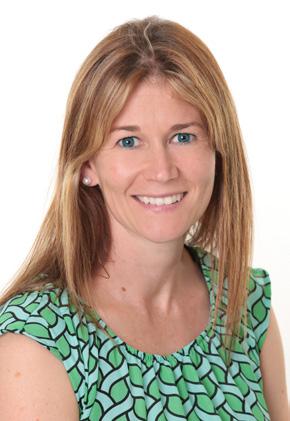


in matters such as small and large scale farming contracts, including syndication work, financing and rural restructuring.
She has been on the Southland branch Council for the last 10 years, becoming the branch’s Vice-President two years ago.
BlackmanSpargo Rural Law Ltd has appointed two new partners, Sandy Van Den Heuvel and Rachel Petterson. Sandy and Rachel have been with BlackmanSpargo since its inception in 2003. They specialise in all areas of rural law involving the sale and purchase of farms, orchards and other rural land, dairy farm joint ventures, bank securities, employment and sharemilking advice, and assisting offshore clients with Overseas Investment Office consent. They both also work in the specialist field of estate planning and farm succession for farming families.
Alice Robertson has joined Hauraki Gulf Law, Waiheke Island. Alice is primarily responsible for matters relating to property including conveyances, trusts, wills and estates. She also assists in family and criminal law. With Alice’s appointment, the Hauraki Gulf Law team now includes six lawyers. The firm has recently opened an Auckland office to cater for residents and clients who live or work in the city.


As well as her Law Society service, Ms Green has served on a number of boards. She was an inaugural director of the company which manages Stadium Southland. She has also served on the board of Sports Southland and has spent a four-year term as a trustee of the Community Trust of Southland. She is currently on the Executive of Cycling Southland and is a trustee of the Southland Amateur Sports Trust.
This community service also gives a hint to her interests, where sports features. She has competed in triathlons, half iron man competitions and the coast-to-coast event.
She has also completed nine Kepler Challenges, a 60km mountain run over the steep and rugged Kepler Track in the Te Anau area.
Ms Green is married to Warren Ruwhiu and they have three children, 14-year-old Nepia, 11-year-old Tess and eight-year-old Keita.
Following the branch’s annual general meeting on 27 March, the new Southland branch Council is Toni Green (President), Phil McDonald (Vice-President), Janet Copeland, Bill Dawkins, Paul Gray (new member), Malcolm McKenzie and Sean Woodward.
❝ Lawyers who use plain language know it doesn’t just make good sense, it makes good cents. Christopher Balmford, former Clarity President.
New Zealand is marking the 100th anniversary of the landings at Gallipoli on 25 April 1915. Among the estimated 147 New Zealand soldiers killed on the first day was Lieutenant Herman Baddeley. Lieutenant Baddeley was the first New Zealand lawyer to die while serving in World War I. There were to be over 50 more.
1891 – 1915
Lieutenant Herman Baddeley was killed in action at Gallipoli during the landing on 25 April 1915. He was aged 23. His body was never found and his name is among those on the Lone Pine Memorial, Lone Pine Cemetery in Turkey.
Herman was born in Greymouth on 13 November 1891. His parents were Fanny and Frederick Atkins Charles Baddeley and he had one older brother, Frederick. He grew up in Kimbolton and Feilding. His father was later manager of the Bank of New Zealand at Kimbolton.
He attended Wellington College and was a member of the school cadets. After leaving school he enrolled at Victoria University College to study law, securing work as a law clerk with Wanganui law firm Prior and Gillespie.
In June 1912 the Wanganui Chronicle reported that Baddeley had “severed his connection” with that firm to work for Bell, Gully and Cooper in Palmerston North. He was presented with a fountain pen by the staff and a “handsome cheque” by his old
firm. While in Palmerston North he was an active member of the territorials, holding the rank of Lieutenant. He played golf and was a member of the Manawatu Golf Club.
He continued to study and on 26 March 1914 he was admitted as a solicitor of the Supreme Court by Chief Justice Sir Robert Stout on the motion of Herbert Edgar Evans (later KC and Solicitor-General). By July 1914 he was practising law in the Waikato town of Otorohanga. He was resident partner there in the newly opened branch of the Te Awamutu firm of Cox, Luxford and Baddeley (later Cox, Luxford and McCarter before its dissolution in 1922). He was involved in the territorials as well, belonging to the Waikato Regiment.
On the outbreak of war Baddeley enlisted immediately. His medical examination report shows he was 5 foot 11 (1.8 metres) tall, weighed 11 stone 10 pounds (74.4 kg) and had brown eyes and black hair.
By early September he held the rank of Second Lieutenant and was among 2,100 men in the mobilisation camp at Auckland. Baddeley embarked from Wellington on 16 October 1914 with the main body of the 16th Waikato Regiment of the Auckland Infantry Battalion. They arrived in Suez, Egypt on 3 December 1914. He was promoted to full Lieutenant on 19 March 1915.
On 25 April 1915 Baddeley was among the New Zealanders who landed at Gallipoli. The Auckland and Canterbury Battalions were the first New Zealand troops to land, starting around 11 in the morning. Baddeley was among the estimated 147 New Zealanders who died on 25 April. His death is mentioned in at least two accounts of the fighting. A letter from Private WH Rhodes of the Auckland Battalion about the day of the invasion stated: “Our major is wounded, our captain shot through the lungs, and Lieutenant Allen (killed) and Baddeley (missing). The last named is supposed to be wounded in the bush somewhere” (in Patrick Gariepy’s Gardens of Hell: Battles of the Gallipoli Campaign, page 55).
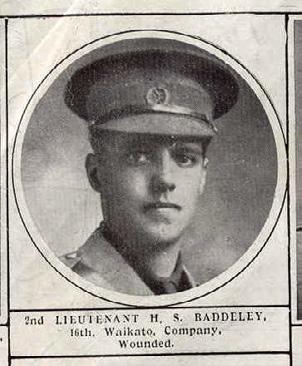
Allen and Baddeley were killed in the fighting on the hill known as Baby 700. This remained in Turkish hands and Baddeley’s body was never recovered. Another eyewitness, Lieutenant Herbert Westmacott of the Auckland Battalion, also encountered Baddeley as they fought their way towards the top of Baby 700. They exchanged a few words (“Our last on

earth together”, Westmacott later stated) and shortly afterwards Baddeley and the surviving members of his platoon, after making a “gallant stand” against a Turkish breakthrough, were all killed (David W Cameron, Shadows of Anzac: An Intimate History of Gallipoli).
The confusion of the landing and an army not used to dealing with such a large number of casualties meant it was many months before Baddeley’s death was confirmed. This must have been extremely upsetting for his family.
He was reported slightly wounded in early May, and in August he was reported to be “previously reported wounded, now after searching inquiries, reported wounded and missing”.
In January 1916 New Zealand newspapers included Lieutenant Baddeley in the list of those “previously reported missing, now reported believed dead (Result of Court of Inquiry).” By February that had changed to “now reported killed in action as result of Court of Inquiry”. The Court of Inquiry was held on 29 January 1916 at Moascar Camp in Ismailia, nine months after the landing. It came to the conclusion “Believed to be dead”.
Baddeley’s name is among the lawyers listed on the Hamilton District Law Society memorial bronze tablet in the Waikato Bay of Plenty branch of the New Zealand Law Society. His name is among those on the Hamilton World War I Memorial and he is also remembered with 57 others on the Otorohanga First World War Memorial.
The 10 New Zealand lawyers who died during the fighting in 1915 will be remembered at the 2015 Anzac Day commemorations at Gallipoli. Christchurch barrister Andrew McKenzie and New Zealand Law Society staff Christine Schofield and Cathy Knight are all attending the commemoration and they will lay a wreath on behalf of the New Zealand Law Society for the legal profession to remember the lawyer soldiers.
As well as Herman Baddeley the lawyers who were killed during fighting at Gallipoli were: Captain Arthur Spedding (2 May), Second Lieutenant Eric Burnard (10 May), Lance Corporal Harry Northcroft (19 May), Trooper George Jackson (5 June), Lieutenant Colonel William Malone (8 August), Major George Mayne (8 August), Lieutenant George Tayler (8 August), Corporal John Persse (8 August) and Major James Houlker (10 August).
Biographies are available on the Law Society’s Roll of Honour, http://my.lawsociety. org.nz/in-practice/people/newzealand-lawyers-roll-of-honour,world-war-i.

This new text published by Thomson Reuters is the first New Zealand franchise of Colinvaux’s Law of Insurance. Based on the English text – which also has a Hong Kong edition (a Singapore version is coming soon) – Colinvaux is an exhaustive and up-to-date work.
International expert Professor Robert Merkin, who edits the English text, is joined as general editor by Associate Professor Chris Nicoll of the University of Auckland. Contributing editors are New Zealand-based Rohan Havelock, Sophie Merkin and Rebecca Sellers.
Colinvaux aims to present a systematic analysis of insurance law in New Zealand. It succeeds. Taking the English original as its starting point, it focuses on the law as it is in New Zealand. Settled principles generally are illustrated with United Kingdom authority. The emphasis though is on New Zealand law, supplemented by English and Australian cases where those guide and inform the New Zealand position.
The Christchurch earthquakes have brought insurance issues to the fore in this country. The volume of claims and the importance of the issues have generated an unprecedented volume of insurance litigation. New Zealand is leading common law development in this area.
The work fills a gap in the market. There has been no new New Zealand text for 22 years. Australian texts have limited relevance given the codification in Australia and some classic English texts have inadequate technical
depth for today’s insurance specialist. It is encouraging that New Zealand-specific insurance law now warrants such a substantial book.
With a dedicated insurance litigation list in the Christchurch High Court, it seems likely that more lawyers are professing competence in insurance than ever before. This comprehensive work will be indispensible for experienced insurance specialists, as well as for new entrants to the field.
The writing is excellent. The style is straightforward, concise and precise. The book is well organised. The structure is coherent. There is adequate detail. This is well balanced between the need for in-depth analysis and sufficient breadth of topics. Legal citations are clear, as are the footnotes.
The book is of great practical value for the insurance practitioner. The sections on subrogation and double insurance are particularly useful. The chapter on liability policies, while less than one tenth of the book’s volume, is amply detailed.
The primacy given to New Zealand law makes the book relevant and accessible to New Zealand lawyers.
For instance the section on fraud in liability policies references IAG New Zealand Ltd v Jackson [2013] NZCA 302. This brokers negligence case nicely illustrates a discussion about fraud in connection with liability policies and the need for a causal connection with the loss.
The section on notification of claims and circumstances gives detailed review of UK cases such as HLB Kidsons (a firm) v Lloyds Underwriters [2008] EWCA Civ 1206, [2009] Lloyds Rep IR 178. This is followed by the application of s 9 Insurance Law Reform Act 1977 and New Zealand’s potential legislative reforms in this area.
The Christchurch earthquakes have given rise to difficult issues around such insurance fundamentals as the meaning of loss, reinstatement of cover, the measure of indemnity and the basis of settlement. The decisions in QBE Insurance (International) Ltd v Wild South Holdings Ltd [2014] NZCA 447 are carefully analysed.

The book is current as at 1 August 2014, but with the last-minute inclusion of important cases such as the Supreme Court’s
decision in Ridgecrest NZ Ltd v IAG New Zealand Ltd [2014] NZSC 117 on reinstatement clauses. Earthquake litigation is continually developing and users of the book must take care to check for recent refinements.
The beauty of Colinvaux’s Law of Insurance in New Zealand lies in the combination of scope, technical detail and rigorous distillation of the of New Zealand position, underpinned by deep analysis of the law in the UK and the wider Commonwealth. This is a new generation text and a modern classic.
Colinvaux’s Law of Insurance in New Zealand, Thomson Reuters New Zealand Ltd, December 2014, 978-0-864728-647, 1,458 pages, paperback and e-book, $340.00 (GST and p&h excluded).
Rebecca Scott is a senior associate at longstanding Auckland boutique insurance litigation practice McElroys, winner of the New Zealand Law Awards Insurance Specialist Law Firm 2014. Rebecca is an experienced litigator, specialising in insurance and professional liability claims.

Goodness knows how the author managed to find time to not only write this book, but to provide a webinar on its many learnings! I have struggled to fit in writing a review.
The second sentence of this book says it all: “Our profession is littered with chronically stressed people leading unhappy lives” – aimed at lawyers, its highly practical and helpful approach will benefit others too.
Yes, you can “have it all”, once you have worked out what your own priorities are – what’s essential for a happy life? What are your personal deal breakers? The trick is to write it down and rank it, prioritise what matters and be prepared to change to get the balance that works for you.
Lots of great contributors generously shared their personal experiences and thoughts. It’s handy to see how many people struggle to fit in everything they want to do
in a day, or have taken on the challenge to make balanced life possible.
Best quote: “Subscribing to the view that we should work in our passion is merely a road to discontent in your career.” (Better to develop a career that supports your real passions in life.)
From someone who hates “self-help” texts: this was not a bad book at all – there are helpful and practical sections on managing time, overcoming procrastination and finding your niche; the advice is pragmatic and could be easily applied.
What I enjoyed was the section on marketing – most of us have this as a pet hate, but having read this I realised that much of what I naturally did incorporated marketing: this immediately relieved the pressure to do more marketing and for that alone the book has saved weeks of angst.
It has some thoughtful comments about working and personal ethical values, and some good tips about the use of mentoring. We should all do more of this. Another plus is the comprehensive chapter on tackling the imposter syndrome – including about
how incredibly common it is among the legal profession in particular, and some clear pointers on making it go away.
Lawyers will enjoy the practical pointers on how to make a career in law work for them, and everyone would probably benefit from a close reading and application of the chapter on stress.

So: how does it stack up? Really, really well. It is clearly set out, the language is plain and readable, there is no psychobabble or handwringing. Best of all, if the tips and hints were applied, real benefits would result.
Would I recommend this book? Yes. This is actually a book that I think you would enjoy reading and find worthwhile across the whole firm, and at home. Give it a go. On the basis of the book I’d even recommend attending the webinar.
Balancing Work and Life: A Practical Guide for Lawyers, LexisNexis NZ Ltd, January 2015, 978-1-927248-02-7, 392 pages, paperback and e-book, $50.00 (GST included, p&h excluded).
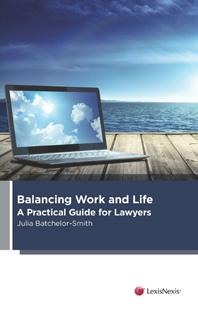
Sharron Wooler is an associate at Cooney Lees Morgan in Tauranga. She was admitted in June 1999 and has over eight years’ specialist experience in resource management matters. Sharron also has a background in infrastructure funding, judicial review and general planning issues.

This workshop will provide participants with an in-depth understanding of investigative interviewing from one of New Zealand’s leading practitioners in this area, Kathryn Beck.
DATE: 21 May 2015 TIME: 8:30am to 12:30pm
“It was an excellent course, with great resources and examples.”
CALL (09) 300 3151
“This is one of the best seminars that I have been to in a while.”
Proceeds of crime litigation by the Commissioner of Police has resulted in hundreds of millions of dollars’ worth of assets being restrained, and many millions of dollars of assets being forfeited to the Crown. The value of assets restrained and forfeited continues to grow, on some accounts at an almost exponential rate.
The law in this area is draconian, and the stakes can be eye watering for clients and practitioners alike. Proceeds work also raises a full spectrum of legal issues, evidential points, aspects of the Search and Surveillance Act 2012, and broader organised crime related law– including laws targeting money laundering and terrorism.
Perhaps the most challenging aspect for many practitioners is that proceeds law routinely straddles the line between the courts’ civil and criminal jurisdictions. Practitioners have to be familiar with all the key tenets of criminal law, and yet primarily operate in the civil sphere, subject to the many technical requirements set down by our old friends, the High Court Rules.
In short, it is fair to say that proceeds of crime law can be fairly daunting. Accordingly, if nothing else, credit is due to Dr Heather McKenzie for tackling the subject head on, and producing a relatively succinct (just over 300 pages of text) introduction to the subject.
The text sets out to be “primarily an educative tool” and its value must be appreciated in that light. This is not a comprehensive practitioner’s bible, although I, for one, tend to doubt the value of texts claiming to be authoritative anyway.
As an introduction, and as a thorough exposition of the key concepts and developments in the field, the text is
difficult to fault. Nonetheless, it would be wrong to rely on this text (or as I say, any text) as a substitute for experience, thorough research, etc.
A current reprint of the Criminal Proceeds (Recovery) Act 2009 is appended, but the text is arranged by logical topics/chapters, rather than as a section by section commentary to the Act. Those practising in proceeds law could do a lot worse than keep a copy handy for ready reference, and as a high quality primer when issues arise. Practitioners not familiar with proceeds work will also find this text a handy reference. The more studious among us could read the text cover to cover, and get a good oversight of the law and key developments. Those under more time pressure (I suspect 99.5%) could usefully cherry pick the book when faced with specific issues.
Cross references and helpful tables are included, and the analysis is generally easy to follow and, importantly, up to date (as at early 2015).
Like any book (as opposed to looseleaf), there will be challenges keeping up to date. Nonetheless, the first principles of proceeds law are well presented, and not likely to date as quickly as more nuanced areas that lie out at the cutting edges.
Overall, the text is likely to prove a useful starting point both in terms of understanding underlying concepts, and identifying the key authorities and developments. As someone who practises in this area, I am glad to have a copy of this text handy and would recommend it to others. Both those working in the field, and those with any interest in proceeds law, are likely to find this text both easy to read and easy to access when material is required on a specific point.
Proceeds of Crime Law in New Zealand, LexisNexis NZ Ltd, February 2015, 978-1-927313-05-3, 457 pages, paperback, $100.00 (GST included, p&h excluded).
Chris Macklin is a senior prosecutor and partner at Gordon & Pilditch in Rotorua. He specialises in criminal prosecutions, but also regularly conducts regulatory prosecutions, including prosecutions under the Civil Aviation Act 1990, and the Resource Management Act 1991. Chris also acts for the Police in proceeds of crime litigation. He is a member of the New Zealand Law Society’s Criminal Law Committee.

 By Susan Corbett and Alexandra Sims
By Susan Corbett and Alexandra Sims

In E-Commerce and the Law, Susan Corbett (Associate Professor in Commercial Law at Victoria University of Wellington) and Alexandra Sims (Associate Professor in Commercial Law at the University of Auckland) have written a good introduction to an important and developing area. They describe the law as at 30 April 2014 (and also what could have been anticipated at that date – for example, the introduction of the Fair Trading Amendment Act).
The book covers a lot of ground. It includes chapters devoted to: the domain name system (eg, registration of domain names and resolution of domain name disputes); trade marks (registered and unregistered, registration, revocation, infringement (at home and abroad), protection overseas); online contracts (eg, standard form contracts, conflict of laws issues); consumer law (including the Fair Trading Act, Consumer Guarantees Act, Sale of Goods Act, and unfair contract terms); security (eg, third party computer crime {viruses/malware, credit card fraud, scams, phishing}, protecting business information); privacy (including the Privacy Act, online personal information, invasion of privacy and breach of confidence); copyright (including an overview of relevant copyright law, copyright infringement, and issues relating to user contributions to the e-trader’s site); and defamation (eg, how the law has been applied in an online context, threats from other jurisdictions, and publishers’/intermediaries’ liability).
Clearly, each chapter has its own body of specialised writing and the book does not purport to provide a comprehensive analysis of each. Instead, recognising the inherent international aspect to any online business, and that the very act of selling goods and services online involves collecting and storing customers’ details, the authors concentrate on: (1) laws affecting the interface of the ‘e-business’ with its customers and (2) laws relating to online information. The authors focus on New Zealand law but endeavour to alert the reader to overseas laws that might affect the ‘e-trader’.
The text does not cover areas of law that, although potentially relevant to e-traders, are common to all businesses (eg, employment, marketing, anti-money laundering, advising a company that is sued overseas).
Nor does it pretend to be a comprehensive guide to all matters ‘digital’ (so there is relatively little on, for example, digital evidence, banking/payments/electronic money, or the tax issues relevant to receiving and accepting orders online). It is, instead, aimed at “New Zealand e-traders and their legal advisors”: it seeks to cover areas particularly relevant to them.
Laws relevant to e-commerce and the internet are difficult to capture. The technologies and legal problems change rapidly and I am not aware of any other similar recent text in the area (for example Simpson Grierson’s Guide to E-Commerce Law in NZ was written in 2002, and Judge David Harvey’s comprehensive internet.law.nz (3rd edition, 2011, 1,040 pages) is more than an introduction).
This book will be a useful text for those who need to be aware of current ‘e-commerce’ issues. It is concise (314 pages) and user-friendly but deals with its areas in sufficient depth for the busy practitioner to understand what the issues are – and what more he or she might need to know. It is a very useful introduction to the key areas and I recommend it.
E-Commerce and the Law, Thomson Reuters New Zealand Ltd, November 2014, 978-0864728-74-6, 314 pages, paperback, $85.00 (GST and p&h excluded).
Nic Scampion is a barrister practising from Auckland’s Shortland Chambers. He practises in most areas of civil and commercial litigation and in employment law. He has advised and represented a wide range of clients and practised from London’s Tanfield Chambers from 2001 to 2010. Nic is a member of the New Zealand Law Society’s Commercial and Business Law Committee.

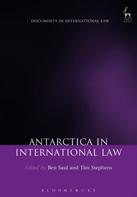
Edited
by Ben Saul and Tim StephensThe editors are law professors at the University of Sydney. The book includes a large number of documents relevant to Antarctica, including the text of treaties and agreements between New Zealand and other countries, judicial decisions, United Nations and other international agreements.
Hart Publishing (England), March 2015, 9781-849367-31-5, 1,136 pages, paperback, £50.00 (p&h excluded).
The authors say this is to mediation what a user’s manual is to their computer: essentially a how-to guide to those developing or improving their mediation practice. The objective is to provide practical skills and strategies within a flexible intellectual framework. The text includes checklists, guidelines, case illustrations, learning outcomes, and self-learning opportunities.
LexisNexis NZ Ltd, March 2015, 978-1-92718338-0, 447 pages, paperback and e-book, $125.00 (GST included, p&h excluded).
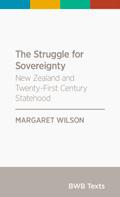 By Margaret Wilson
By Margaret Wilson
Former Attorney-General, Minister of the Crown, Speaker and current Professor of Law Margaret Wilson looks at the neo-liberal reforms in New Zealand since 1984 and their impact on New Zealand’s constitution, its public service, its legal system and national sovereignty.
Bridget Williams Books, April 2015, 978-0908321-20-9, 99 pages, paperback and e-book, $4.99 e-book, $14.99 paperback (GST included).
One of the tricky things about stress is that each of us experiences stress differently. This makes it difficult to describe what “normal” stress looks like, and subsequently, to define clearly at what point stress turns into something more serious.
In general terms, identifying stress usually means noticing specific changes in ourselves, or someone else. Usually these changes fall into these categories:
» Physical changes – such as body tension or feeling breathless;
» Emotional changes – maybe feeling overwhelmed or anxious;
» Thinking changes – perhaps having trouble seeing the big picture or remembering important details;
» Behaviour changes – being less productive or drinking too much coffee. Of course there can be other reasons for changes like these. However, usually if we notice several changes over a specific time period we often identify the signs as signs of stress.
This is another tricky question to answer because again there are individual
differences.
Some people are comfortable with, and even enjoy, high levels of stress. They may think of the signs as signs of challenge, or excitement. Other people experience even small amounts of stress as uncomfortable.
There is no right or wrong about this, it’s just personal style and preference. It is helpful to know which style you tend to prefer as this has implications for career and life choices.
One fact we do know is that as human beings, we perform best and maintain better well-being when stress or challenge is for specific periods of time, and is balanced with recovery (when we recharge our mental and physical batteries). Oscillating between periods of challenge and periods of recovery is ideal.
Back to our original question then – when does stress become something more serious?
Psychologists usually answer this by asking people questions about time frames and the impact of the stress on someone’s life and functioning.
Generally, stress may become a problem, or something more serious, when it has been going on for too long, when there hasn’t been enough opportunity for recovery, and/ or when the stress is interfering in the person’s ability to do their job well or function well in their life: for example
the stress is interfering with their ability to be a good parent, or to maintain close relationships.
As well as this interference in the person’s life or functioning, or both, stress can morph into other difficulties. Often these will show up as anxiety or depression.
What should you do if you notice these signs in yourself, or in someone else? Firstly, and most importantly, tell someone, and get help.
The person you tell will ideally be someone you trust, and whom you feel comfortable with. You don’t have to give details; just let them know you are finding things hard. If the words are hard, show them this article, or anything else you have seen or
read which describes how you are feeling.
Secondly, seek help for yourself, or ask the person you have told to do it for you or with you, if the help seeking feels too hard.
Good places to start include:
» your GP;
» your Employee Assistance programme at work;

» NZ Depression Helpline 0800 111 757; or
» NZ Mental Health Foundation www.mentalhealth.org.nz
The good news is anxiety and depression are both very treatable. With a combination of the right help and support, and sometimes with medication, people recover well and stay well.
Often the treatment includes reviewing the person’s usual coping strategies for managing stress, and adding to these strategies with some new tools to strengthen personal and professional resilience.
Signs that you or someone else might be experiencing depression or anxiety include:
» sad, depressed or irritable mood;
» feeling guilty;
» less interest or pleasure in usual activities;
» withdrawing from or avoiding people;
» finding it harder than usual to do things;
» trouble concentrating, difficulty making decisions;
» suicidal thoughts, even making a suicide plan;
» recurrent thoughts of death;
» low self-esteem or self-worth;
» seeing the future as hopeless;
» self-critical thoughts;
» tiredness or loss of energy;
» significant weight loss or decrease in appetite (but not if you are dieting);
» change in sleep pattern – difficulty sleeping, or sleeping more than usual; and
» decreased sexual desire.
» feeling nervous;
» frequent worrying;
» trembling, twitching, feeling shaky and restless;
» muscle tension, muscle aches, muscle soreness;
» restlessness;
» easily tired, shortness of breath;
» rapid heartbeat;
» sweating not due to the heat;
» dizziness or light-headedness;
» nausea, diarrhoea or stomach problems, frequent urination;
» hot flashes or chills;
» trouble swallowing or “lump in throat”, dry mouth;
» feeling keyed up or on edge;
» trouble falling or staying asleep;
» avoiding places where you might be anxious;

» frequent thoughts of danger;
» seeing yourself as unable to cope; and
» frequent thoughts that something terrible will happen.
Gaynor Parkin has worked for two decades as a clinical psychologist in New Zealand and the United Kingdom. She is the founding director of Umbrella, which provides workplace resilience training for a broad range of public and private sector organisations. Gaynor also lectures for the Psychology Department at Victoria University. Gaynor is the co-author of the book I’ve had it up to here: from stress to strength, published by Consumer NZ in 2008 and reprinted in 2011. Gaynor tests out the robustness of resilience tools when juggling her psychology work with the joys and challenges of parenting twin boys.
❝ The good news is anxiety and depression are both very treatable.
Whether in response to inquiries from a regulator, or to investigate potential misconduct or operational failures, companies frequently conduct internal investigations.
Investigations raise a number of legal issues, including in relation to legal privilege, employment law and privacy. Questions of broader legal strategy also often come into play, in particular mitigating the risk of any enforcement action. This article identifies tips to assist in-house counsel to navigate the key legal issues that arise during an investigation.

Before undertaking an investigation, it is crucial that you understand the potential for a civil claim or criminal prosecution relating to the issues under investigation. This context allows companies to assess risk, to ensure the investigation is conducted by a person appropriate for the context, and to consider whether legal privilege may apply to the investigation report.
Where an investigation is triggered by a document request from a regulator, there are some particular issues that should be considered at the outset:
» What is the potential legal context of the request? Why is the regulator seeking information? What might happen next? Are there potential issues in more than one jurisdiction?
» Should the company investigate or volunteer information not strictly covered in the scope of the request?
» What are the legal consequences of non-compliance?
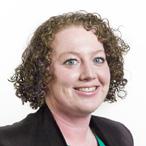
(Is the request mandatory or voluntary? If it is mandatory, what happens if you don’t comply?)
» Is the deadline for compliance realistic? Is there an ability to negotiate the deadline?
There is a range of people that could conduct an investigation – including management, directors, internal or external audit, in-house legal, compliance, external solicitors or forensic accountants. Factors considered in determining who is best placed to conduct an investigation will usually include capacity, expertise and cost. Independence from the issues and the people under investigation (perceived as well as actual) should also be considered.
Where a lawyer has been instructed to conduct an investigation, the work can potentially attract privilege. The courts have recognised that communications are privileged even if they do not contain advice on matters of law, provided they are directly relevant to the performance
of the lawyer’s duty to the client. However, a report that is not prepared by a lawyer will not usually be privileged, unless “litigation privilege” attaches. There are two key requirements for litigation privilege to attach:
» legal proceedings must be on foot or be “apprehended” (a definite prospect rather than a vague anticipation); and
» the report must prepared for the dominant purpose of preparing for those legal proceedings.
The application of privilege to investigations can be complex and fact-specific. It is prudent to obtain legal advice at the outset of the investigation, to understand the scope of any protection from disclosure offered by privilege.
Prepare terms of reference that carefully define the scope of the investigation and maximise the availability of legal privilege
It is good practice to draw up written terms of reference. This is particularly the case when an external party is being instructed and you want to ensure a tight rein is kept on the scope of the investigation. Key purposes of a terms of reference document include:
» setting out very clearly the aims of the investigation;
» defining the scope of the investigation, in terms of both issues to be covered and any proposed limitations in terms of access to people or documents;
» recording who is conducting the investigation and to whom in the company (and in what form – written or oral) they are to report; and
» setting time frames.
Privilege should be front of mind when drafting the terms of reference, as it provides an opportunity to maximise the ability to claim privilege over the report and communications with the investigation team. Where litigation privilege may be claimed over a report, the terms of reference should record that the company anticipates proceedings and that the dominant purpose of the investigation is preparing for those proceedings.
Given privilege is a matter of substance and not form, this alone will not guarantee a claim of privilege is successful. The terms of reference will need to be implemented in the way intended for privilege to attach.
Take proportionate steps to preserve evidence and record those steps
You should act to make sure that relevant documents are not destroyed – whether inadvertently or otherwise.
In some circumstances you will be obliged to do this. For example, if court proceedings are reasonably contemplated, the High Court Rules
impose a duty to preserve documents. This is a relatively low threshold and could be triggered by sending or receiving a letter before action or instructing external counsel.
Compliance with these obligations requires retention of “documents”. This covers virtually all forms of information – both hard copy and electronic – “that are, or are reasonably likely to be, discoverable in the proceeding”. This often requires specialist assistance from forensic computing specialists.
For in-house counsel, this means ensuring appropriate confidentiality agreements are put in place (often at pace) and that the forensic specialists’ data security measures are sufficient to meet your Chief Information Officer’s requirements. It may be prudent to have standing measures in place to ensure action can be taken in a timely manner without raising alarm bells.
It is only relatively recently that this duty became codified in New Zealand and if experience in other jurisdictions is any guidance, as time goes on we can expect to see some potentially serious consequences where a company lets this obligation slip.
Possible consequences include costs implications, adverse influences in the proceeding and action for contempt of court.
Keep internal disclosures of the fact the investigation is taking place to those who “need to know” and consider whether you should disclose the fact of the investigation to third parties
Disclosure should be carefully considered. It will usually be necessary to disclose the existence of the investigation to employees who will be interviewed or who need to preserve or provide documents. It is important to keep this internal communication to a “need to know” basis, particularly because internal communications between employees about the investigation will not usually be privileged.
There are three guiding principles when communicating internally:
» provide enough information to stop speculation and to obtain the co-operation you need;
» ensure employees understand enough about the investigation to be able to identify and preserve relevant documents (to the extent this is required) and are advised about creating further documents/commenting on the investigation in documents; and
» remind employees about their duty of confidentiality. Broader internal communication may need to be reconsidered if there is a fear that the investigation may become public. If it does, it is better for employees to hear about it from the company, not the media. This would also provide an opportunity to remind employees how to handle any media enquiries.
Consideration should also be given to external communication. In some situations, disclosure will be required (for example, to insurers and continuous disclosure obligations to the market). In other situations, communication is optional, but may be desirable (for example, to the FMA and
Commerce Commission, which have policies around voluntary disclosure and co-operation with consequences for potential penalties imposed). Conversely, in some situations, disclosure is prohibited. For example, a regulator may have imposed a confidentiality obligation or the matter may fall within the “tipping off” offence in the Anti-Money Laundering and Countering Financing of Terrorism Act 2009.
If it is permissible to disclose externally and you decide to do so, there are some pointers to keep in mind:
» Generally it is a good idea to distinguish between the facts found and the legal consequences. You should not volunteer a view that a company or an employee has acted in breach of the law.
» Consider any confidentiality obligations (such as bank secrecy obligations) when you are dealing with a voluntary disclosure. Can customer information be redacted? Would it be better (for PR reasons) to wait until disclosure is required by law?
» Where you are considering disclosing information or a communication that is privileged, consider whether there is any way of maintaining privilege. Can privileged material be redacted? Can a limited waiver of privilege be negotiated?
An employer remains subject to all usual employment obligations (both statutory and contractual) during an investigation. This includes a statutory obligation of good faith (which includes an express duty to be responsive and communicative). Critically, the employer remains subject to this obligation even if a third party is conducting the investigation on the employer’s behalf.
The consequences of a heavy handed investigator could be a range of personal grievances or good faith claims from employees who do not feel they have been treated fairly.
It is important from the outset that everyone is clear about the nature of the process. An employee’s participation in an investigation is just that – it is not a disciplinary process.
Dismissal or other disciplinary sanctions should not be an outcome of the investigation, although a disciplinary process (culminating in dismissal) may be. This important distinction has consequences for statutory obligations regarding process and provision of information (although, regardless of the type of process, obligations regarding access to personal information under the Privacy Act will continue to apply).
Should the investigative process be triggered by a “whistle blower” employee, consideration may also need to be given to the Protected Disclosures Act and any workplace policies.
» Carefully consider the legal context before you proceed, including the possibility of claiming/preserving privilege
» Ensure the legal context is reflected in who you instruct to conduct the investigation and how that process is conducted (as recorded in the terms of reference).
» Understand – and comply with – your legal obligations to preserve documents
» Carefully consider internal and external communications
» Ensure the investigation and interviews are conducted in a manner which complies with employment obligations
Polly Pope is a litigation partner of Russell McVeagh and Kylie Dunn is a senior associate in the firm’s employment team.
If you have not yet submitted your online CPD declaration it is now overdue.
The CPD Rules provide for overdue declarations. Essentially, a late declaration of compliance is a flag to the Law Society that you have not managed to comply with the CPD Rules in a timely way. If you have not made your declaration, the Law Society will follow you up to ascertain why and if it can assist you. Not declaring may result in an audit and a referral to the Lawyers’ Complaints Service.
Overdue online CPD declarations are made in the same way as on-time declarations. You can follow the instructions set out in one of the emails you will have received from the Law Society, or else follow the instructions you will find on the CPD page of the Law Society website: www. lawsociety.org.nz/cpd.
If you believe that truly exceptional circumstances have prevented you from completing your CPD requirements, you may contact the Law Society for clarification on whether applying to defer your CPD declaration is applicable to your situation. There is no provision for lawyers to be
totally exempt from declaring.
If you are planning to retire at the end of the current practice year, you may have chosen not to complete your current CPD requirements. If that is the case you must let the NZLS registry manager know if you haven’t already done so, otherwise you will continue to be contacted in regards to your non-declaration. Should you subsequently decide to return to practice you will need to complete any CPD requirements which may be outstanding.
You can find a link to the CPD Rules, information on how to complete your CPDPR and a form for applying for a deferment on the CPD page at the web address shown above.
LawTalk welcomes letters to the Editor. Letters should ideally be restricted to a maximum of 450 words, although shorter letters are most welcome. Letters may be abridged or edited, and LawTalk reserves the right to not publish any letter submitted. Letters should be sent to LawTalk as either a Microsoft Word document or in a form that can be copied and pasted into a Microsoft Word document. They can be sent to editor@lawsociety.org.nz
The current discussion within the profession about self-represented litigants (LawTalk, 860) points to a broader issue that is close to our hearts – access to justice.
Providing and improving access to justice has been the mission for Auckland Community Law Centre since we were established in 1977. The hidden underbelly of the rise in self-litigants are those claimants who simply give up their just claims because the legal process is too hard. It is a special breed of person who represents themselves in court – courageous and tenacious (or in some cases foolhardy). However, for every self-litigant there will be many whose claims go unenforced. Ensuring that just claims get enforced is a key focus for community law centres.
Unfortunately, law centres have fewer resources to call on when litigation is required. In 2011 Auckland Community Law Centre devoted 75% of its resources to litigation services. In 2014 litigation services were restricted to just 15%. These changes are a result of purchasing decisions made by the Ministry of Justice.
On top of this is a funding freeze for all law centres dating back to 2008 which has eroded our own purchasing power by around 10%. There is no doubt this erosion of our capacity to represent people has aggravated the self-litigant issue.
Self-litigants should be supported but there are risks: the more they are supported the more likely it is they will go to court.
We suggest targeting this issue in two places:
» focus on early resolution to reduce the flow of self-litigants; and
» generously support those whose only option is to litigate. Community law centres seem an ideal vehicle for delivering parts of this solution: we have an infrastructure in place; we have pedigree in improving
access to justice. We already work with an early resolution focus and are actively working on increasing pro bono support through the litigation process.
Visit www.justitia.co.nz
Or Contact: Mr Ross Meijer, Aon New Zealand 04-819-4000 ross.meijer @aon.com
By developing these attributes an opportunity exists to improve access to the courts for self-litigants and, more broadly, access to justice for our communities. With appropriate support and investment in community law many access to justice challenges can be tackled.
DARRYN AITCHISON Auckland Community Law CentreI am writing this on behalf of the little people: little in stature, little in status, little in importance – really, just little, little people who, by happenstance, happen to practise law from tiny little offices with no view and, to put it bluntly, bugger all light.

The work we do is of little importance. Our clients, having been rejected by bigger lawyers, have lost their will to succeed but, nevertheless, want to trudge on. Indeed, that is what we do: we help people trudge.
We look up, wistfully, at the BIG awards, such as “INTERNATIONAL DEAL OF THE YEAR” and “NEW ZEALAND DEAL OF THE YEAR”, which compels me to ask: “Why can’t we have some recognition of the work we do in supporting trudging?”

That murmur soon replies: “We’ll have our own awards.” I can see it now: somewhere flash like the public bar at the Strand Hotel with everyone wearing a shirt with a collar. And we’ll have a bouncer at the door, to keep people away from our keg.
I’m doing it – not just yet because I’ll have to save for the shirt – but

I’m going to get started and if you’ll print this letter calling for nominations, I’ll be well on the way. Nominations are called for the following categories:
1 Biggest Little Deal in Pukekohe;
2 Longest Letter to the Minister of Immigration;
3 Most Implausible Successful Plea for an Adjournment (subcategories for civil, family and criminal courts);
4 Fewest Complaints to my Friends at Standards Committee 3;
5 Most Spartan Casebook which, nevertheless, technically complies with rule 7.39; and




6 Most Final Adjournments in any Insolvency Proceeding, whether corporate or personal.











 RAY PARMENTER Auckland
RAY PARMENTER Auckland
You’ve invested plenty of time and money into building a brilliant website. Now what? You need to get people there and you need to sell your law firm and services to them. But how?
Chris Price has been working in online marketing for over a decade and specialises in businesses that want to use their website to sell their services. Chris shares his advice on how to transform your website into a lead-generating machine.

As a lawyer, you know how to create a compelling case, what to do to help your client put their best and most persuasive foot forward and what rabbits to pull out of the hat to wow your audience and win against the opposition. However, many lawyers aren’t quite sure how to put these same skills to use in creating a stand-out website.
You don’t let your opposition win against you in the courtroom – you surely don’t want them to win against you in the fight for new clients! So what can you do to stand out from your competitors online?
To win business through your website, you need to make sure your website is geared towards those visitors arriving via Google. That is, those who plug “lawyer”, “barrister”, “divorce lawyer” etc into the Google search engine. (These Google visitors are quite different in their behaviour and what it is they’re looking for compared with those who come to your website via a recommendation.)
There are four things you need to keep in mind in order to convert Google visitors into clients:
1. Google visitors are comparing you to others.
If you had five law firms side by side on a street, someone in need of a lawyer would nip into each of them until they found the right fit for them. This is exactly what happens when people use Google to search for a service.
Just think, how many search results do you click on when you use Google? I would hazard a guess it’s more than one – at least two, possibly four or five if you are casting your net wide. You’ll enter each website looking for the same things and mentally classify what you see compared to what you have seen before.
Now here’s the lesson: you need to make sure your website has all the same aspects as those other three law firms from the Google search, so that your potential client can tick them off in their head.
For instance, say someone is looking for a lawyer to help manage a staff dispute situation in their business. They’d Google “employment lawyer Auckland” and click on the first four results. I say they’d expect to find professional headshots of intelligent-looking lawyers and a bio about each of them and what they specialise in, plus some thought-leadership articles that illustrate their understanding of the issues you are facing.
These are what I call “content prerequisites” – the items people expect to see on a law firm page, in the same way they expect to see images of amazing houses on an architect’s page or the latest jobs and industry insights on a recruitment company page.
If there are no photos of your lawyers and very little that talks about your expertise in this specific area, your site (and firm) will most likely be culled from the list.
Google visitors are actively filtering out rather than filtering in when they search and click so make sure your site has the “content prerequisites” expected of your field of expertise.
Your content prerequisites make sure you’re still in the running to be considered – but your site needs to go one step forward to then stand out.
❝ You don’t let your opposition win against you in the courtroom – you surely don’t want them to win against you in the fight for new clients!
Google searchers are actively looking for a point of difference in the results they see. They want to end their search – the sooner the better. They’re looking for that one thing that resonates with them and makes you the strongest contender.
How do you differentiate yourself from other lawyers? The same way you endear yourself to people and strike up a friendship. You make sure you come across as friendly and helpful.
You write your copy in a tone that is professional and authoritive but also simple and easy to understand – talking down to potential clients or over their head will just intimidate and alienate. You let them know that you’re passionate about the area you specialise in and that you have the expertise and knowledge to help with the issues they’re experiencing.
But it doesn’t need to be just you talking about how good you are – let your clients do some of the heavy lifting here! Share their testimonials or great feedback. Write up some simple case studies from successful cases. This social proof will put your potential client at ease that you know what you’re doing and you’re good at it.
3. The Google visitor is moving at speed.
Okay, your potential client has bounced off Google into a search result. How fast are they going as they click, scroll and click again?
From what we see in our clients’ Google Analytics accounts, these visits can take between 25 seconds and five minutes, depending on the quality of the site and the product or service on offer.
I always suggest you imagine your Google visitor being on a particular mission and moving at pace – so don’t get in their way! Make sure your website isn’t slow-moving due to massive images and/or a hosting system that just can’t keep up or you’ll be thrown out of contention in the click of a mouse.
4. They’re like vampires: they need to be invited in.
You’ve put your best foot forward, you’ve made it clear what you can do for them, so why aren’t they ringing you to set up an appointment?
For many, ringing a lawyer is quite intimidating. Will I be charged by the second? Am I then stuck with them? I’m out of my depth here – what if they think I am dumb? How do I explain my problem? Do I even need to speak to them at this stage?
Take away all the hesitations they have by selling them the next step; invite them in. Make contacting you an easy, non-intimidating process.
Offer a low-cost or complimentary first visit. Or a free 10-minute phone call. Or turn the tables and say someone from your office will call them to learn more about their situation and how they can help –get them to answer a few questions via a survey online first.
Chris Price is the founder of Ark Advance, which specialises in helping SMEs optimise their websites to sell more services online. They offer a free monthly email newsletter focused on helping business owners grow their services online. Sign up for free at www.arkadvance.com
The NZLS Library, legal research and document delivery service is fast, e cient and thorough. With our extensive resources we can provide comprehensive cost-e ective searches of case law and commentary both in New Zealand and internationally.

FOR MORE INFORMATION ABOUT OUR SERVICES: www.lawsociety.org.nz/home/for-lawyers/lawlibrary/services
 Use
Use







With hundreds of thousands of events scheduled in New Zealand District Courts each year, a smarter approach to scheduling is set to deliver benefits for those that work in and use the criminal courts.



Traditionally District Court users have been told to come to court in the morning and wait for their case to be called. The worst case scenario is a wait of up to seven hours. This is not a good use of the time of our partners such as Corrections, Police and lawyers. This is also an added stress for victims of crime, and a lot to ask of the family members and friends who come to support them.
All District Courts with sufficient volume are moving to a more efficient approach to scheduling.
Rather than being expected to come to court for the day, people will be asked to come for a block of time.
For example, a District Court might schedule a day’s sentencing events into three 75 minutes blocks. Participants will be asked to be at court by the start of the time block to which their event is assigned. By 1 April 2015, sentencing, Crown sentencing, case reviews and jury trial call-over events will be scheduled into time blocks. Lists will also be time-blocked shortly after this.

Court staff will be working with local stakeholders to determine scheduling of time blocks that make sense for each court.
Getting the full benefit from these changes is dependent on all court users coming to court at their scheduled time.
Time-blocking has been made easier by a substantial upgrade to the system used to schedule cases so a time and date for the next hearing can be set before the parties leave the courtroom.
Real time scheduling also paves the way for future developments, such as providing Police and Corrections improved visibility to up-to-date court schedules and first appearance availability.


Reducing waiting times also needs to be balanced against the best use of judicial time. Initially this will be addressed by a “morning heavy” approach to scheduling to ensure that there are sufficient cases to proceed with. This aligns with the current national judicial rostering capacities set by the Chief District Court Judge.
Smarter scheduling will improve the court experience by reducing the time court users have to spend in court waiting for their case to be heard. This is part of delivering a modern, accessible people-centred justice system.
Tony Fisher is the General Manager, District Courts at the Ministry of Justice.
A new order that came into effect on 1 January 2015 better protects victims of serious violent and sexual offences.
The Victims’ Orders Against Violent Offenders Act 2014 recognises the effects of this offending on victims and reduces the risk of unwanted contact between victims and their offender.
Victims of violent offences can apply for a non-contact order to prohibit the offender from contacting them in any way. A judge can also impose special conditions such as stopping an offender from living or working in particular areas, or visiting those areas. An order can also cover an offender’s associates.


A victim can apply for a non-contact order if they were a victim of a violent offence where the offender was sent to prison for more than two years. An application can be made at any time after the offender is sentenced. However, a non-contact order cannot be put in place if the person applying already has a protection order or a restraining order against the offender.
An application for a non-contact order is made through the civil jurisdiction. There are no filing or hearing fees, and an applicant can request that their contact details not be given to the offender.
More information, including application forms, is available from the Ministry of Justice website, www.justice.govt.nz/courts/civil/ civil-disputes/non-contact-orders

Corporate and commercial lawyers may be interested in the heated debate that has resumed in recent months about whether or not artists should receive royalties from second and subsequent resales of their artworks in the secondary market.
The topic was deliberated in 2007, with a discussion paper prepared by the Ministry for Culture and Heritage. However since then there has been no movement to enact legislation to make artist resale royalties a reality.
Depot Artspace, a community based arts centre in Auckland, has awoken the debate with an exhibition entitled “Pre-Loved Re-Loved” which ran throughout February. The exhibition promised that for all sales of over $1,000 the artist would receive 5%, and an accompanying publication championed the adoption of an artist resale royalty scheme.
Artist resale royalties, also known as “droit de suite” and “artist resale rights”, were first introduced in France in 1920. They arose out of necessity when countless artists were living in poverty while dealers sold their works for often hefty prices.
Since then, the idea that artists should continue to see some financial benefit when their artworks resell has spread to more than 50 countries around the world.
In 2001 the European Union issued a directive requiring all member states to implement artist resale royalty legislation into domestic law by 2006. The United Kingdom has had an Artist Resale Right scheme in place since then, which operates a sliding scale of the percentage received by the artist relative to the sale price of the artwork. Australia enacted the controversial Resale Royalty Rights Act in 2010. This scheme applies to living artists and continues for 70 years after their death, though only for artworks which sell for more than $1,000. Although currently under review, approximately AU$2,000,000 in royalties have been collected since the scheme’s inception.
The 2007 Ministry for Culture and Heritage discussion paper proposed the creation of an inalienable right of the artist to 5% royalties on all resales.
This was seen as increasingly worth considering given the steady growth of New Zealand’s secondary art market. It was suggested that resale royalties would apply to all intermediary sellers operating in the art market, regardless of whether the artist had retained copyright in the artwork.
The discussion paper proposed that a natural fit for the royalty legislation would be within the Copyright Act 1994. The ministry’s website records that of 200 submissions received from interested parties, most favoured an artist resale right.
As the Depot Artspace literature describes, artists’ resale royalties are popular among many visual artists. The royalties would offer additional income throughout an artist’s life and in many situations would continue to generate income for the estates of deceased artists.
Supporters point to the fact that a number of others forms of copyright work involve retained ownership rights that generate royalties for a number of years, but that visual artists seldom enjoy the same benefits.
However, opponents have identified the potential administrative nightmare that would come from introducing a resale royalty scheme in New Zealand.
In Australia royalties are collected by the Copyright Agency unless
❝ What is clear is that there is no straightforward divide between the supporters and opponents of artist resale royalties.
Louisa Gommansotherwise specified by the artist. Large auctions houses, including Christies London, have expressed concern about the effect of the scheme on art sales, especially in relation to high value artworks.
Some have suggested that it might drive art purchasers to countries where the market is not encumbered by resale royalty legislation. Others have felt an impact on their profit margins by choosing to absorb the royalty costs rather than pass them on to purchasers.
Some artists have even
voiced concern that a resale royalty scheme stands to benefit artists who are already successful rather than emerging artists, identifying that a large number of artists produce artworks which do not reach the secondary art market. What is clear is that there is no straightforward divide between the supporters and opponents of artist resale royalties.
A legislative change introducing artist resale royalties in New Zealand will be of particular interest to lawyers practising in the commercial and corporate sectors, and is likely to create new areas of work.
A resale royalty scheme will have implications in terms of tax paid by both artists (or their estates) and secondary sellers. In the case of deceased artists, there will be ongoing work for the management of estates dealing with any income generated by the royalties.
Art dealers and galleries may look to amend their contracts and terms and conditions, to strengthen provisions relating to the way royalty fees are paid. With these possibilities in mind, we will watch with anticipation the progress of this debate in the coming months.
Louisa Gommans is a commercial lawyer at Rainey Collins Lawyers in Wellington. She has an honours degree in art history and Italian, and is slightly obsessed with art. In her spare time she reads and researches about art law, and sometimes travels to Italy to attend art crime conferences. She is also involved in organising New Zealand’s first art crime symposium, to be held in Wellington in September 2015. You can contact Louisa at lgommans@ raineycollins.co.nz

John Horner Ben Johnston Andrew Leete
Mark Odlin
Graeme Switzer Daniel Wong
Tim MacAvoy Neil Russ
This webinar will consider key aspects of the employment relationship including good faith, changing terms, disciplinary action and performance management. Advice to ensure a fair process will be covered from both the perspectives of the employer and employee.
This practical “transaction” based two-day workshop will equip you with the knowledge and understanding to deal with the purchase, establishment, operation and sale of a business.
1
1
Noel Sainsbury
The Foreign Account Tax Compliance Act (FATCA) is US law with far-reaching effects for New Zealand lawyers. This webinar will consider how you can establish whether your firm and/or clients are affected by this legislation, along with practical advice that you can provide to assist your clients in meeting their obligations under FATCA.


This practical two-day workshop will cover the fundamentals of being an effective criminal lawyer. The course addresses the steps that young lawyers need to know about to prepare for and run a Judge-alone trial in the District Court.
Janine Bonifant Tom Gilbert
Whether you are a prosecutor or defence lawyer, identifying and dealing with hostile and difficult witnesses is vitally important to ensure your client’s case is properly put before the Court. By attending this webinar you will learn the correct techniques for confidently managing these witnesses.
Chair: Michelle Burke
6.5
SECTION 21 AGREEMENTS – SHADES OF GREY?
2.5 CPD hours
2 CPD hours
Amanda Donovan Jennie Hawker
Attend this day to be updated on the latest issues, legal requirements and complexities with enduring powers of attorney, residential care subsidies and gifting, family protection claims and wills, retirement villages, complaints process – Health and Disability Commissioner, trusts, and
provision of DHB support services.
Agreements under s 21 of the Property (Relationships) Act 1976 require a greater degree of input, knowledge and “crystal ball gazing” to ensure that they withstand the test of time. You will be updated on recent case law and look at the “grey areas” encountered when drafting living agreements.
Her Hon Judge Mary O’Dwyer Emma Parsons
Hear how the most fundamental changes to family law practice in 30 years have fared so far and learn how to deal with the effects of these changes and practise high quality family law.
3.5
2
Virginia Goldblatt Denise Evans
For those with recent approved prior mediation training, including our Part A course. This programme will be an opportunity to practise mediation skills in the family law area and then to be assessed on them. Strictly limited numbers with pre-course work required.
15
1
13
Chair: Greg Kelly Courts are handling an unprecedented number of lawsuits over family trusts. In addition to claims on death, claims are now being triggered by separation, loss of mental capacity and as a result of inter-family struggles. With the increase in scrutiny, you need to be on top of your game, and should not miss what will be a dynamic and informative conference.
Liza Fry-Irvine
Lauchie Griffin
Nick Kearney
Duncan Terris
This very popular two-day, limited number workshop, designed for solicitors at the start of their property career, and legal executives with some experience, follows three files, from client instructions to settlement and beyond.
Frances Cooke QC
Taking a practical approach to the principles and processes of judicial review this seminar provides expert guidance in the basics of judicial review, how to run a judicial review and how to avoid judicial review.
Virginia Goldblatt Geoff Sharp
14.5
Robyn Pearce
Mediation knowledge and skills are an increasingly important adjunct to legal practice. Many more clients are taking disputes to mediation (because it works) and the more that their legal advisers know about how it works the better. In addition, practice as a mediator extends the service that lawyers can offer the public.
In today’s increasingly busy world we are faced with the challenge of managing more information than ever before. Attend this webinar for practical strategies for simplifying your paper and information flow, reducing stress and increasing productivity as you say goodbye to a cluttered office environment.
Irene Joyce
5.5
STEPPING UP –FOUNDATION FOR PRACTISING ON OWN ACCOUNT
18.5 CPD hours
Director: John Mackintosh
INSURANCE – NEW CHALLENGES
3.5 CPD hours
2 CPD hours
Neil Campbell QC
Storm McVay
Peter Woods
In today’s commercial reality, only the best-run firms will achieve the level of profitability to re-invest in their practices and keep up to date with modern law firm management essentials. This workshop will identify some day-to-day attitudes, skills and systems that partners need to achieve profitable high performing leveraged teams, beginning with effective leadership.
All lawyers wishing to practise on their own account whether alone, in partnership, in an incorporated practice or as a barrister, will be required to complete this course. (Note: From 1 October 2012 all lawyers applying to be barristers sole are required to complete Stepping Up). Developed with the support of the New Zealand Law Foundation.

A crucial seminar examining insurance from beginning to end – and what to look out for on the way through. Gain an understanding of the evolving market, issues and practical aspects of how insurance works, and how to work alongside brokers for better outcomes for your clients.
7 CPD hours
Chair: Judge David Harvey
This conference will give practitioners, law professionals and those in the ICT industry an opportunity to increase their awareness and understanding of the impact of IT on the law and legal practice. It will discuss recent changes in technology law and provide an insight on areas of concern, interest and possible future developments.
Anthony Paul Blair (also known as Paul Anthony Blair) has been suspended for three years from 12 March by the New Zealand Lawyers and Conveyancers Disciplinary Tribunal.
In [2015] NZLCDT 9, Mr Blair, who is not currently practising, admitted having been convicted of offences punishable by imprisonment which reflected on his fitness to practise or tended to bring the profession into disrepute.
A jury in the Hamilton District Court found Mr Blair guilty of selling cannabis and possessing cannabis for the purpose of sale.
While visiting a friend at a known tinnie house, Mr Blair answered the door. He sold one cannabis tinnie for $20 to an undercover police officer and at the time of sale was also holding three other tinnies in his hand. This led to the inference that it was for the purpose of future sale.
Strike-off must be the starting point for the consideration of penalty, the Tribunal said in its decision.
“It views the respondent’s offending seriously. The distinguishing feature is that as a barrister he engaged in the sale of drugs to the public. This fact alone must call into question his fitness to practise. The class of the drug sold is immaterial to the offending.”
The Tribunal said it took into account the following factors when deciding that a penalty short of strike-off could be imposed:
» Mr Blair’s otherwise good character and advocacy work that he has carried out in the community; and
» that there is no evidence that this offending has been other than isolated. The Tribunal concluded that Mr Blair should be suspended and that the period of suspension should reflect the seriousness of the offending.
The period of some four years’ voluntary suspension since the offending “has not persuaded us to impose a shorter period of suspension when it is considered that he would likely not have obtained a practising certificate,” the Tribunal said.
Although Mr Blair asked that no costs orders be made against him because he had low income, debts and no assets, the Tribunal ordered him to pay half the Law Society’s costs of $5,100 and half the Tribunal’s costs of $3,191.
Nova Lorraine Camp has been struck off by the Court of Appeal in [2015] NZCA 15 after being convicted on charges that involved fraudulently presenting cheques totalling just over $40,000.
Ms Camp did not hold a practising certificate at the time and this meant the New Zealand Law Society did not have jurisdiction to lay charges with the New Zealand Lawyers and Conveyancers Disciplinary Tribunal.
The Law Society therefore had to apply to the High Court for a strike off, which then referred the decision to the Court of Appeal under s 267(1)(b) of the Lawyers and Conveyancers Act 2006.
In February 2013, Ms Camp pleaded guilty to three charges of using a document to obtain a pecuniary advantage. She was sentenced to seven and a half months’ home detention and 200 hours’ community work.
Ms Camp was the treasurer of a rowing club. She was responsible for producing financial reports and budgets for the committee, as well as paying bills on behalf of the club. Over a sustained period, she presented more than 100 cheques totalling just over $40,000.
“Ms Camp abused the duty she owed to the club to act honestly and in good faith,” Justice Simon Moore said in his High Court
decision, [2014] NZHC 2738.
“Given the gravity of the offending and, in particular, the gross breach of trust involved, I am of the view that this is a proper case to make an order striking Ms Camp’s name off the roll on the grounds she is not a fit and proper person to be a practitioner.”
Ms Camp did not appear in either the High Court or the Court of Appeal, nor did she take any steps to defend the proceedings.
Admitted in January 1999, Ms Camp last held a practising certificate in 2004. The offending that led to her conviction took place in 2011 and 2012.
The Court of Appeal said it agreed with Justice Moore that it was appropriate to make an order striking Ms Camp’s name off the roll of barristers and solicitors, and accordingly made that order.
The New Zealand Animal Law Association is hosting a lecture by American legal scholar Professor Steven Wise. The lecture will be held at the Northey lecture theatre, Auckland University at 6pm on 7 May.
The fundamental legal categories are “person,” possessed of the capacity for legal rights, and “things,” which lack it. A legal wall separates humans from the other animals, which remain “things.” In this talk, Professor Wise will examine efforts to elevate the legal status of certain nonhuman animals through strategic litigation.
The World Justice Project’s World Justice Forum V will be held at King’s College, London from 6 to 9 July. Participants from more than 100 countries are expected to take part in the forum and expand their global networks. See http:// worldjusticeproject.org/world-justice-forum
Comments concerning the suitability of any of the below-named applicants for the certificate or approval being sought should be made in writing to me by 30 April 2015. Any submissions should be given on the understanding that they may be disclosed to the candidate. The Registry is now advertising names of candidates for certificates of character, practising certificates and approvals to practise on own account on the NZLS website at www.lawsociety.org.nz/for-lawyers/law-society-registry/applications-for-approval
— Christine Schofield, Acting Registry Manager
christine.schofield@lawsociety.org.nz
04 463 2940 0800 22 30 30 04 463 2989
Under Part 3 of the Lawyers and Conveyancers Act 2006
Sara R Abdul Maged (Al-Kabban
Sara Reyadh Abdul Maged)
Allen James Robert
Arnott Campbell William Lindsay
Belcher Richard William
Bennett Ashleigh Rose
Berger Laura Patricia
Botha Cornelius Alewyn Johannes
Botterill (Formerly Ghaemaghamy)
Adam Stevenson
Bracewell Joseph Grant
Brady (Nee Kidd) Katherine Barbara Ruth
Bryan Nicola Vonda
Cattin Chanelle Marie
Chan Joyce Yan Yin
Chang Christine
Chen Ernie Yu-An (aka Yu-An)
Choi Jiin (Gina)
Choi Jonathan
Coupe Hamish Bradford
Draper Andrew Robert Christopher
Duffy Kent Andrew Lewis
Dunlop Alyssa Mae
Farnell Sarah Patricia
Ford Beth
Frost Marica Nicole
Greenslade Lillie Patricia
Gribben Sarah Louise Paige
Hamlin Marek John
Hancock Hamish Rufus
Hawkes Linley Marlene
Hemi Donna Michelle
Hingston Michelle Henri Rata Te Hei Kura
Hodgson Jaylene Emily
Hossain MD Monir (aka Muhammad Munir)
Ishmael (Previously Amin) Diako (Previously Diako Aras)
Jairam Meera
Johnston Annaliese
Jones Hannah Frances
Jones Kristy Emily Marama
Kanji Trishna
Kaur Dilpreet (Gloria)
Kaur Harmeet
Keane Natalie Louise
Keen Ryan John
Ko Ian Sean
Kyriak Theodore Gregor
Lal Kya Raina
Lee Christine Su Mary (Christine)
Lennie Elizabeth Clare Mary
Lombardi Lorenzo Roberto
Martell Coby Marie Daphne
Martin Hannah Alice
McClintock (Previously Clark)
Marie-Louise Constance
McGrath (Previously Cozens) Emma Alice
McHardy Meika Kylie
McLeod Jonaan Ngamoni
Milford Rebekah Geordan
Milne Georgia Nancy
Mo Cherry (previously known as Mo Chuan Jing)
Morarji Manesha
Naran Salena Sangeeta
Neria Kristina Leute
Newson-Brown Callum Chisholm
Panzer Michelle Anne
Park Jin Sil (Jinsil)
Pedersen (Nee Pascoe) Adele Shirley
Perera Sonali Maria (Formerly
Perera Don Maria Sonali)
Pickering Caroline Paloma
Pivac Samuel Joseph
Under s30 of the Lawyers and Conveyancers Act 2006
Bali Ashika
Bloy Thomas David
Castiglione Karen Elizabeth
Greenwood Samuel John
Hewison Grant James
Lee Ami
Lee Christopher David
McRae Peter Richmond
Prasad Joseph Michael
Prasannan Jaya
Rahman Mohammad Abdur
Rendall (Nee Shallard) Katherine Kingsbury
Ridenton Laura Roberta
Robertson Alistair James
Robinson Elise Daisy
Rogers Heather Taylor
Ross Nathan Jon
Russell Ryan John
Sapolu Michael
Shah Shanam Shazneen
Siddall Adam William
Smith Natasha Danielle Paxton
So Wan Pa (Barbara)
Song Jizheng (Jessie)
Stone Laura Rose Archer
Sutton Oliver John Milburn
Syder Anthony Paul
Tan Richard Roland How Goh
Thompson Conal Gian
Toilolo Salamasina Faleilua T
Tupuola Ally Taliilagi
Upton Olivia Claire
Vaai Angela Koroseta
Vulangi Toakase
Walker David Vincent
Wallace Mary Joan
Wang Xin (John)
Wilkinson Wendy Karen
Williams Arena Hinekura Sherburd
Williams Belinda Jayne
Williams Megan Ruth
Yoon Eun Bee (Kayley)
Yung Catherine Ying En
Singh Yashveen
Withers Shannon Daniel
FOR

Phone: 021 712 555 1883 – 2014
• Educating and advocating
• Working with Senior Management and Board members
• International liaison
North Shore, Auckland
Consequent upon the planned retirement of the principal, this longestablished suburban law practice is for sale.
Dealing mainly in property, trusts, estates, commercial, consumer and family law, with an emphasis on conveyancing, this practice has built up an enviable reputation resulting in its significant client-base. The acquisition of the lease of the office premises is optional.
This law practice would suit a local firm seeking to expand its client-base and local presence, or an out-of-town firm wishing to establish a foothold in Auckland.
Genuine enquiries only please, in confidence, to:
Confidential Advertiser No. 15-01 (c\- Christine Wilson)
New Zealand Law Society, PO Box 5041, Wellington 6145
Bian, Xingwu
Cameron, Ross Donald Charles
Jones, Leslie Llewellyn
Litchwark, Anna Louise
McDonald, John Reginald
Ngatai, Duncan James
Pereira, Raphael Lawrence
Perrin, Arthur William
Raeina, Gene Hewey
St George, Karl Robert
The Commission’s purpose is to achieve the best possible outcomes in competitive and regulated markets for the long-term benefit of New Zealanders.
With oversight of the Competition Branch’s advocacy portfolio you will work with senior managers and Commissioners to ensure a consistent approach to advocacy.
You will be a strategic thinker, using your analytical mind and lateral thinking to put your own and other people’s ideas in to action. Using your knowledge and experience to oversee and provide input into key pieces of work within the Competition Branch, you will also work with key stakeholders to contribute a Commission perspective on policy development.
You and your team will be fundamental to the success of the Commission’s advocacy and education programme, liaising with the business community and consumer groups to educate them on topics relating to the Commission. You will also be part of a team that provides advice or input to government on various topics, including law reform relating to the work of the Commission.
You will be instrumental in building and maintaining strong relationships with international stakeholders on behalf of the Commission to ensure ongoing knowledge sharing and capability growth.
This is a brilliant opportunity for you to share your knowledge and enthusiasm through leading, coaching and mentoring a team of intelligent motivated individuals. Ideally you will have a post graduate qualification in law or economics and have:
• Experience in an advocacy environment
• Exceptional leadership skills
• The ability to engage effectively and build credible relationships
• Significant experience working in a multidisciplinary environment
• The ability to communicate complex information effectively.
You will be part of a professional, multidisciplinary team in a collaborative and supportive work environment. You will also receive a competitive remuneration package and ongoing professional development opportunities.
This is a fantastic opportunity for an experienced, motivated and intelligent person to make a difference for the long term benefit of New Zealanders.
To apply for this role, please send your CV and a covering letter to work@comcom.govt.nz
Alternatively, contact Janet Rees, Senior Human Resources Adviser on 04 924 3719 for more information.
Applications close 5pm, Thursday 30 April 2015.
www.comcom.govt.nz/careers
Wong, Leslie Chiu Kai
Young, Why Chu
Would any lawyer holding a will for the above named, late of 59 Penguin Drive, Murrays Bay, Auckland, Self-Empolyed, born on 13 September 1967, who died on 23 December 2014, please contact Peter Zhang, Forest Harrison Lawyers:
peter@forestharrison.co.nz
09 308 0080 09 308 0082
PO Box 828, Shortland Street, Auckland 1140 DX CP22011
Ross Donald Charles Cameron
Would any lawyer holding a will for the above named, late of 60 Brightside Road, Stanmore Bay, Whangaparaoa, born on 22 June 1954, who died on 17 February 2015, please contact Rob Merlo, Merlo Burgess & Co:
robmerlo@merloburgess.co.nz
09 972 3817 or 027 282 8599
PO Box 51486, Pakuranga 2140
Leslie Llewellyn Jones
Would any lawyer holding an original of a will dated 5 May 2005 (or any subsequent will) for the above named, formerly of Tauranga and Auckland, who died on 13 March 2015 aged 103 years, please contact Bob Eades, Wynyard Wood:
eades@wynyardwood.co.nz
09 969 0126 09 309 1044
PO Box 204 231, Highbrook 2161
Would any lawyer holding a will for the above named, late of Blenheim, Student, born on 6 October 1991, who died on or about 24 February 2015, please contact Keely Bennett, Gascoigne Wicks:
kbennett@gwlaw.co.nz
03 579 1856 03 578 4080
PO Box 2, Blenheim 7240
We are a specialist Family Court firm in Hawkes Bay. We have a position for an intermediate/senior lawyer, experienced in family law work generally, but in particular CYFS, Care of Children and Domestic Violence cases. Please forward a letter of application together with a CV by 15 May 2015.
À 06 835 2400



We are a successful, long-established general practice in Papatoetoe Central (5 minutes walk from train station) seeking additional staff to meet our ongoing expansion needs and a recent retirement.
We offer a collegial environment and a wide range of work to test and develop your skill set. You will ideally be a qualified NZILE or lawyer with at least five years’ recent experience in conveyancing, small business and lease transactions, trusts and estate administration. With excellent communication skills and a solid work history you will be confident, efficient and customer service oriented – able to work on your own initiative to meet performance targets and develop ongoing positive relationships with clients.
Pamela Fairbrother Fairbrother Family Law
à PO Box 646, Napier 4140 { pamela@fairbrotherfamilylaw.co.nz
John Reginald McDonald
Would any lawyer holding a will for the above named, late of Hamilton, who died on 16 March 2015, please contact Anthony J Nolan, Barrister & Solicitor:
ajntrust@xtra.co.nz 07 834 0365 07 838 9244
PO Box 1268, Hamilton 3240 DX GP20038
Duncan James Ngatai
Would any lawyer holding a will for the above named, late of 14 Flower Street, Bulls, Widower, who died on 22 March 2015, please contact Mark Richardson, Lawyer:
markjrichardson@paradise.net.nz 06 327 8606
06 327 8595 PO Box 216, Marton 4741 DX PA84503
Raphael Lawrence Pereira
Would any lawyer holding a will for the above named, late of 21 Roseneath Place, Birkdale, Auckland, Security Worker, born on 27 October 1966, who died on 13 March 2015, please contact Michael Pereira:
mcpereira@xtra.co.nz 021 318 777
21 Roseneath Place, Birkdale, Auckland 0626
Arthur William Perrin
Would any lawyer holding a will for the above named, late of 21 Wycola Avenue, Christchurch, who died on 9 September 2014, please contact Nicki Sowman, Malley & Co:
nicki.sowman@malley.co.nz 03 379 0712 03 365 4613
PO Box 1202, Christchurch 8140
Gene Hewey Raeina
Would any lawyer holding a will for the above named, late of 39 Farwood Drive, Henderson, Auckland, Civil Engineer, born on 8 February 1979, who died on 15 November 2014, please contact Reuben & McGeachie Law:
jreuben@rmlaw.co.nz 09 835 1520 09 835 1519
PO Box 21-113, Henderson, Auckland 0650
Karl Robert St George
Would any lawyer holding a will for the above named, late of Auckland, Company Director/Builder/Developer, who died on 27 March 2015, please contact Howard-Smith & Co:
reception@howard-smith.co.nz 09 379 3231 09 307 8884
PO Box 5386, Wellesley Street, Auckland 1141 DX CP24018
Leslie Chiu Kai Wong
Would any lawyer holding a will for the above named, late of 26 Longford Street, Mt Wellington, Auckland, who died on 13 September 2014, aged 89 years, please contact Dawsons:
Lawhelp@dawson-partners.co.nz 09 272 0002
09 272 0001 PO Box 38143, Howick, Auckland 2145
Why Chu Young
Would any lawyer holding a will for the above named, late of 35 Hamlin Road, Mount Wellington, Auckland, Grocer, born on 6 September 1956, who died on 27 February 2015, please contact Stella Chan, Forest Harrison Lawyers:
stella@forestharrison.co.nz 09 308 0080 09 308 0082
PO Box 828, Shortland Street, Auckland 1140 DX CP22011
I am a sole practice office situated in Katikati in the sunny Bay of Plenty.

I am looking for a lawyer with at least 1 year’s PQE. The work will include that of a general rural practice including conveyancing, possible litigation, property planning and so on.
The position includes a wonderful work environment in a small town and long term prospects for the suitable applicant.
Please forward your application and CV to Irene@kaimailaw.co.nz
We completely understand
CV’s to lisat@btlawauckland.co.nz





Paul Davies Law Limited is an Auckland CBD based sole practice that wants to grow. I am Paul Davies, and I am looking for a partner/director; ideally you would be someone willing to make the move from a senior associate role to become a business owner.




Your particular area of expertise or interest could be property, finance, commercial or litigation. What is important to me is that you are at the top of your game, you want to develop your own practice and that we can get along with each other and have a similar co-operative and collegial approach.
Advantages for you include that this business has a low overhead structure, has flexibility on how it operates, leverages established business and trust accounting systems and has an existing solid client base of corporate and high net worth Trust clients.
There is nothing to lose from having a chat. Please feel free to phone or email me in confidence.
The Public Defence Service (PDS) is New Zealand’s largest criminal law practice, lead by highly experienced criminal lawyers. We are currently seeking a Senior Lawyer to join the team based in Manukau. We have a commitment to providing independent, high quality, timely legal advice and representation in a full range of criminal cases. Reporting to the Deputy Public Defender, Manukau, your enthusiasm and skills will contribute to the delivery of high quality defence services within the South Auckland Courts. You must be an experienced criminal litigator, with a PAL 3 or 4 approval (or the eligibility to obtain this within a short time frame). You will have strong advocacy skills, will be able to work in a team, relate well to people from diverse backgrounds and be able to manage a personal caseload, largely comprised of jury trial work. This is a great opportunity to grow your experience and advance your legal career within a collegial and supportive team environment. The South Auckland Courts are one of the busiest court clusters in the country, offering a varied criminal caseload, including high profile and challenging cases. This position also involves regular High Court trials and appearances. A significant part of this role will include mentoring and leading your own team of junior and intermediate lawyers where you can develop your leadership skills and managerial experience. Applications will be considered from both defence lawyers and prosecutors with experience in the trial jurisdiction. The PDS can offer you a commitment to your ongoing professional development, a competitive salary and the opportunity to make a contribution to the legal profession in New Zealand. To apply, please visit http://careers.justice.govt.nz


Applications will close on 17 May 2015.
There will shortly be a process for the appointment of Referees in the Nelson Region. Members of the public are invited to submit the names of persons who are considered suitable for appointment as Referee.
Nominations must be sent in writing or by email. They must contain the name, address, telephone number and email address of both the nominator and the person being nominated.
Once a nomination has been received, the person who is nominated will be sent an application pack with details relating to the position and how to apply for it.
Nominations are to be made to the Principal Disputes Referee, Private Bag 32 001, Featherston Street, Wellington 6146, Ph: (04) 462 6695, or email: karen.green@justice.govt.nz
Nominations must be received by this office no later than 12 noon on Friday 1 May 2015